Chicago | ||
| Allmusic Biography : According to Billboard chart statistics, Chicago is second only to the Beach Boys as the most successful American rock band of all time, in terms of both albums and singles. Judged by album sales alone, as certified by the R.I.A.A., the band does not rank quite so high, but it is still among the Top Ten best-selling U.S. groups ever. If such statements of fact surprise, thats because Chicago has been singularly underrated since the beginning of its long career, both because of its musical ambitions -- to the musicians, rock is only one of several styles of music to be used and blended, along with classical, jazz, R&B;, and pop -- and because of its refusal to emphasize celebrity over the music. The result has been that many critics have consistently failed to appreciate its music and that its media profile has always been low. At the same time, however, Chicago has succeeded in the ways it intended to. From the beginning of its emergence as a national act, it has been able to fill arenas with satisfied fans. And beyond the impressive sales and chart statistics, its music has endured, played constantly on the radio and instantly familiar to tens of millions. Chicago marked the confluence of two distinct, but intermingling musical strains in Chicago, Illinois, in the mid-60s: an academic approach and one coming from the streets. Reed player Walter Parazaider (born March 14, 1945, in Chicago), trumpeter Lee Loughnane (born October 21, 1946, in Chicago), and trombonist James Pankow (born August 20, 1947, in St. Louis, Missouri) were all music students at DePaul University. But they moonlighted in the citys clubs, playing everything from R&B; to Irish music, and there they encountered less formally educated but no less talented players like guitarist Terry Kath (born January 31, 1946, in Chicago; died January 23, 1978, in Los Angeles, California) and drummer Danny Seraphine (born August 28, 1948, in Chicago). In the mid-60s, most rock groups followed the instrumentation of the Beatles -- two guitars, bass, and drums -- and horn sections were heard only in R&B.; But in the summer of 1966, the Beatles used horns on "Got to Get You into My Life" and, as usual, pop music began to follow their lead. At the end of the year, the Buckinghams, a Chicago band guided by a friend of Parazaiders, James William Guercio, scored a national hit with the horn-filled "Kind of a Drag," which went on to hit number one in February 1967. That was all the encouragement Parazaider and his friends needed. Parazaider called a meeting of the band-to-be at his apartment on February 15, 1967, inviting along a talented organist and singer he had run across, Robert Lamm (born October 13, 1944, in Brooklyn, New York). Lamm agreed to join and also said he could supply the missing bass sounds to the ensemble using the organs foot pedals (a skill he had not actually acquired at the time). Developing a repertoire of James Brown and Wilson Pickett material, the new band rehearsed in Parazaiders parents basement before beginning to get gigs around town under the name the Big Thing. Soon, they were playing around the Midwest. By this time, Guercio had become a staff producer at Columbia Records, and he encouraged the band to begin developing original songs. Kath, and especially Lamm, took up the suggestion. (Soon, Pankow also became a major writer for the band.) Meanwhile, the sextet became a septet when Peter Cetera (born September 13, 1944, in Chicago), singer and bassist for a rival Midwest band, the Exceptions, agreed to defect and join the Big Thing. This gave the group the unusual versatility of having three lead singers, the smooth baritone Lamm, the gruff baritone Kath, and Cetera, who was an elastic tenor. When Guercio came back to see the group in the late winter of 1968, he deemed them ready for the next step. In June 1968, he financed their move to Los Angeles. Guercio exerted a powerful influence on the band as its manager and producer, which would become a problem over time. At first, the bandmembers were willing to live together in a two-bedroom house, practice all the time, and change the groups name to one of Guercios choosing, Chicago Transit Authority. Guercios growing power at Columbia Records enabled him to get the band signed there and to set in place the unusual image the band would have. He convinced the label to let this neophyte band release a double album as its debut (that is, when they agreed to a cut in their royalties), and he decided the group would be represented on the cover by a logo instead of a photograph. Chicago Transit Authority, released in April 1969, debuted on the charts in May as the band began touring nationally. By July, the album had reached the Top 20, without benefit of a hit single. It had been taken up by the free-form FM rock stations and become an underground hit. It was certified gold by the end of the year and eventually went on to sell more than two million copies. (In September 1969, the band played the Toronto Rock n Roll Festival, and somehow the promoter obtained the right to tape the show. That same lo-fi tape has turned up in an endless series of albums ever since, including Anthology, Beat the Bootleggers: Live 1967, Beginnings, Beginnings Live, Chicago [Classic World], and Chicago Live. To Guercios surprise, he was contacted by the real Chicago Transit Authority, which objected to the bands use of the name; he responded by shortening the name to simply "Chicago." When he and the group finished the second album (another double) for release at the start of 1970, it was called Chicago, though it has since become known as Chicago II. Chicago II vaulted into the Top Ten in its second week on the Billboard chart, even before its first single, "Make Me Smile," hit the Hot 100. The single was an excerpt from a musical suite, and the band at first objected to the editing considered necessary to prepare it for AM radio play. But it went on to reach the Top Ten, as did its successor, "25 or 6 to 4." The album quickly went gold and eventually platinum. In the fall of 1970, Columbia released "Does Anybody Really Know What Time It Is?," drawn from the groups first album, as its next single; it gave them their third consecutive Top Ten hit. Chicago III, another double album, was ready for release at the start of 1971, and it just missed hitting number one while giving the band a third gold (and later platinum) LP. Its singles did not reach the Top Ten, however, and Columbia again reached back, releasing "Beginnings" (from the first album) backed with "Colour My World" (from the second) to give Chicago its fourth Top Ten single. Next up was a live album, the four-disc box set Chicago at Carnegie Hall, which, despite its size, crested in the Top Five and sold over a million copies. (The band itself preferred Live in Japan, an album recorded in February 1972 and initially released only in Japan.) Chicago V, a one-LP set, released in July 1972, spent nine weeks at number one on its way to selling over two million copies, spurred by its gold-selling Top Ten hit "Saturday in the Park." Chicago VI followed a year later and repeated the same success, launching the Top Ten singles "Feelin Stronger Every Day" and "Just You n Me." The next Top Ten hit, "(Ive Been) Searchin So Long," was released in advance of Chicago VII in the late winter of 1974. The album was the bands third consecutive chart-topper and another million-seller. "Call on Me" became its second Top Ten single. Chicago VIII, which marked the promotion of sideman percussionist Laudir de Oliveira as a full-fledged bandmember, appeared in the spring of 1975, spawned the Top Ten hit "Old Days," and became the bands fourth consecutive number one LP. After the profit-taking Chicago IX: Chicagos Greatest Hits in the fall of 1975 came Chicago X, which missed hitting number one but eventually sold over two million copies, in part because of the inclusion of the Grammy-winning number one single "If You Leave Me Now." Chicago XI, released in the late summer of 1977, continued the seemingly endless string of success, reaching the Top Ten, selling a million copies, and generating the Top Five hit "Baby, What a Big Surprise." But there was trouble beneath the surface. The bands big hits were starting to be solely ballads sung by Cetera, which frustrated the musicians musical ambitions. They had failed to attract critical notice, and what press attention they were given often alluded to Guercios Svengali-like control as manager and producer. Chicago determined to fire Guercio and demonstrate that they could succeed without him. Shortly afterward, they were struck by a crushing blow. Kath, a gun enthusiast, accidentally shot and killed himself on January 23, 1978. Though he, like most of the other members of the band, was not readily recognizable outside the group, he had actually had a large say in its direction, and his loss was incalculable. Nevertheless, the band closed ranks and went on. Guitarist Donnie Dacus was chosen from auditions and joined the band in time for its 12th LP release, which was given a non-numerical title, Hot Streets, and which put prominent pictures of the bandmembers on the cover for the first time. The sound, as indicated by the first single, the Top 20 hit "Alive Again," was harder rock, and the bands core following responded, but Hot Streets was Chicagos first album since 1969 to miss the Top Ten. Chicago 13 then missed the Top 20. (At this point, Dacus left the band, and Chicago hired guitarist Chris Pinnick as a sideman, eventually upping him to full-fledged group-member status.) Released in 1980, Chicago XIV, the last album to feature de Oliveira, didnt go gold. By 1981, with the release of the 15th album, the poor-selling Greatest Hits, Vol. 2, the band parted ways with Columbia Records and began looking for a new approach. They found it in writer/producer David Foster, who returned to an emphasis on the bands talent for power ballads as sung by Cetera. They also brought in one of Fosters favorite session musicians, Bill Champlin (born May 21, 1947, in Oakland, California), as a full-fledged bandmember. Champlin, formerly the leader of the Sons of Champlin, was a multi-instrumentalist with a gruff voice that allowed him to sing the parts previously taken by Kath. With these additions, the band signed with Full Moon Records, an imprint of Warner Bros., and released Chicago 16 in the spring of 1982, prefaced by the single "Hard to Say Im Sorry," which topped the charts, leading to a major comeback. The album returned Chicago to million-selling Top Ten status. Chicago 17, released in the spring of 1984, was even more successful -- in fact, the biggest-selling album of the bands career -- with platinum certifications for six million copies as of 1997. It spawned two Top Five hits, "Hard Habit to Break" and "Youre the Inspiration." The renewed success, however, changed the long-established group dynamics, thrusting Cetera out as a star. He left the band for a solo career in 1985. (Pinnick also left at about this time, and the band did not immediately bring in a new guitarist.) As Ceteras replacement, Chicago found Jason Scheff, the 23-year-old bass-playing son of famed bassist Jerry Scheff, a longtime sideman with Elvis Presley. Scheff boasted a tenor voice that allowed him to re-create Ceteras singing on many Chicago hits. The split with Cetera had a negative commercial impact, however. Despite boasting a Top Five hit single in "Will You Still Love Me?," 1986s Chicago 18 only went gold. The band recovered, however, with Chicago 19, released in the spring of 1988. Among its singles, "I Dont Want to Live Without Your Love" made the Top Five, "Look Away" topped the charts, and "Youre Not Alone" made the Top Ten as the album went platinum. Another single, "What Kind of Man Would I Be?," originally found on the album, was included as part of the 1989 compilation Greatest Hits 1982-1989 (which counted as the 20th album) and became a Top Five hit, while the album sold five million copies by 1997. At the turn of the 80s into the 90s, Chicago underwent two more personnel changes, with guitarist DaWayne Bailey joining and original drummer Danny Seraphine departing, to be replaced by Tris Imboden. Chicago Twenty 1, released at the start of 1991, sold disappointingly, and Warner rejected the bands next offering (though tracks from it did turn up on compilations). Chicago, however, maintained a loyal following that enabled them to tour successfully every summer. In 1995, Keith Howland replaced Bailey as Chicagos guitarist. The same year, the band regained rights to its Columbia catalog and established its own Chicago Records label to reissue the albums. They also signed to Giant Records, another Warner imprint, to release their 22nd album, Night & Day, a collection of big-band standards that made the Top 100. In 1998, they released Chicago 25: The Christmas Album on Chicago Records, and they followed it in 1999 with Chicago XXVI: The Live Album. And the success of The Very Best of Chicago: Only the Beginning demonstrated that their music continued to appeal to fans. Feeding off the renewed interest, the band reappeared in 2006 with the new album Chicago XXX on Rhino. Two years later, the rejected Warner album from 1993 was finally released by Rhino as Stone of Sisyphus: XXXII. Chicago toured regularly during the final years of the 2000s and returned to the recording studio with producer Phil Ramone for the 2011 album O Christmas Three (aka Chicago XXXIII). During the early 2010s, they performed often, and ventured on several joint tours with the Doobie Brothers. In May of 2013, the band announced theyd begun recording for their next album, and released several singles sporadically throughout the rest of the year. They also made a splash at the 2014 Grammy Awards, performing several of their classics with Robin Thicke. The album, aptly titled Chicago XXXVI: Now, was their first collection of original material in eight years and appeared in July 2014. Chicago was inducted into the Rock & Roll Hall of Fame in 2016; Peter Cetera declined to attend the ceremony. Now More Than Ever: The History of Chicago, a two-hour documentary about the bands career, debuted on CNN in 2017. | ||
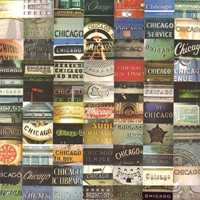 | Album: 1 of 42 Title: Greatest Hits Vol. I Released: Tracks: 11 Duration: 47:20 Scroll: Up Down Top Bottom 25% 50% 75% AlbumCover | 1 25 or 6 to 4 (04:53) 2 Does Anybody Really Know What Time It Is? (03:22) 3 Color My World (03:02) 4 Just You n Me (03:45) 5 Saturday In The Park (03:56) 6 Feelin Stronger Every Day (04:17) 7 Make Me Smile (03:02) 8 Wishing You Were Here (04:37) 9 Call On Me (04:04) 10 (Ive Been) Searchin So Long (04:31) 11 Beginnings (07:51) |
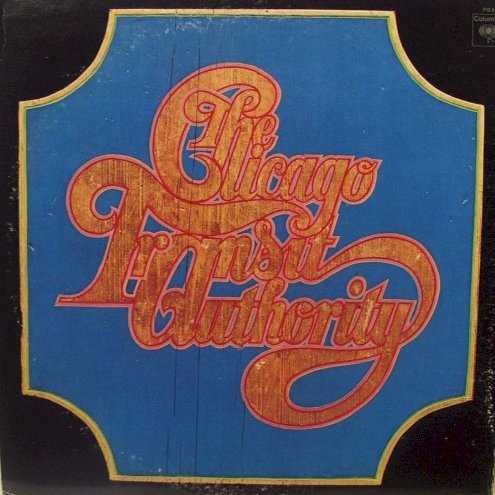 | Album: 2 of 42 Title: The Chicago Transit Authority Released: 1969 Tracks: 12 Duration: 1:16:30 Scroll: Up Down Top Bottom 25% 50% 75% Allmusic Wikipedia AlbumCover | 1 Introduction (06:35) 2 Does Anybody Really Know What Time It Is? (04:34) 3 Beginnings (07:51) 4 Questions 67 and 68 (04:58) 5 Listen (03:20) 6 Poem 58 (08:37) 7 Free Form Guitar (06:49) 8 South California Purples (06:11) 9 I’m a Man (07:41) 10 Prologue, August 29, 1968 (00:57) 11 Someday (August 29, 1968) (04:13) 12 Liberation (14:39) |
| The Chicago Transit Authority : Allmusic album Review : Few debut albums can boast as consistently solid an effort as the self-titled Chicago Transit Authority (1969). Even fewer can claim to have enough material to fill out a double-disc affair. Although this long- player was ultimately the septets first national exposure, the group was far from the proverbial "overnight sensation." Under the guise of the Big Thing, the group soon to be known as CTA had been honing its eclectic blend of jazz, classical, and straight-ahead rock & roll in and around the Windy City for several years. Their initial non-musical meeting occurred during a mid-February 1967 confab between the original combo at Walter Parazaiders apartment on the north side of Chi Town. Over a year later, Columbia Records staff producer James Guercio became a key supporter of the group, which he rechristened Chicago Transit Authority. In fairly short order the band relocated to the West Coast and began woodshedding the material that would comprise this title. In April of 1969, the dozen sides of Chicago Transit Authority unleashed a formidable and ultimately American musical experience. This included an unheralded synthesis of electric guitar wailin rock & roll to more deeply rooted jazz influences and arrangements. This approach economized the finest of what the band had to offer -- actually two highly stylized units that coexisted with remarkable singularity. On the one hand, listeners were presented with an incendiary rock & roll quartet of Terry Kath (lead guitar/vocals), Robert Lamm (keyboards/vocals), Peter Cetera (bass/vocals), and Danny Seraphine (drums). They were augmented by the equally aggressive power brass trio that included Lee Loughnane (trumpet/vocals), James Pankow (trombone), and the aforementioned Parazaider (woodwind/vocals). This fusion of rock with jazz would also yield some memorable pop sides and enthusiasts favorites as well. Most notably, a quarter of the material on the double album -- "Does Anybody Really Know What Time It Is?," "Beginnings," "Questions 67 and 68," and the only cover on the project, Steve Winwoods "Im a Man" -- also scored as respective entries on the singles chart. The tight, infectious, and decidedly pop arrangements contrast with the piledriving blues-based rock of "Introduction" and "South California Purples" as well as the 15-plus minute extemporaneous free for all "Liberation." Even farther left of center are the experimental avant-garde "Free Form Guitar" and the politically intoned and emotive "Prologue, August 29, 1968" and "Someday (August 29, 1968)." The 2003 remastered edition of Chicago Transit Authority offers a marked sonic improvement over all previous pressings -- including the pricey gold disc incarnation. | ||
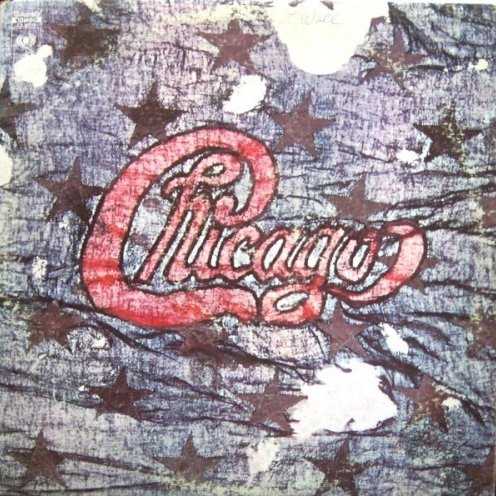 | Album: 3 of 42 Title: Chicago III Released: 1971-01 Tracks: 23 Duration: 1:11:27 Scroll: Up Down Top Bottom 25% 50% 75% Spotify TrackSamples Allmusic Wikipedia AlbumCover | 1 Sing a Mean Tune Kid (09:15) 2 Loneliness Is Just a Word (02:37) 3 What Else Can I Say (03:14) 4 I Don’t Want Your Money (04:46) 5 Flight 602 (02:44) 6 Motorboat to Mars (01:30) 7 Free (02:15) 8 Free Country (05:47) 9 At the Sunrise (02:47) 10 Happy ’cause I’m Going Home (07:28) 11 Mother (04:30) 12 Lowdown (03:37) 13 A Hard Risin’ Morning Without Breakfast (01:52) 14 Off to Work (00:46) 15 Fallin’ Out (00:53) 16 Dreamin’ Home (00:49) 17 Morning Blues Again (01:10) 18 When All the Laughter Dies in Sorrow (01:05) 19 Canon (01:05) 20 Once Upon a Time… (02:34) 21 Progress? (02:35) 22 The Approaching Storm (06:26) 23 Man vs. Man: The End (01:33) |
| Chicago III : Allmusic album Review : Chicagos third effort, much like the preceding two, was initially issued as a double LP, and is packed with a combination of extended jams as well as progressive and equally challenging pop songs. Their innovative sound was the result of augmenting the powerful rock & roll quartet with a three-piece brass section -- the members of whom are all consummate soloists. Once again, the group couples that with material worthy of its formidable skills. In the wake of the bands earlier powerhouse successes, Chicago III has perhaps been unrightfully overshadowed. The bulk of the release consists of three multi-movement works: Robert Lamms (keyboards/vocals) "Travel Suite," Terry Kaths (guitar/vocals) "An Hour in the Shower," and James Pankows (trombone) ambitious and classically influenced "Elegy." While the long-player failed to produce any Top Ten hits, both Lamms rocker "Free" -- extracted from "Travel Suite" -- as well as the infectious "Lowdown" respectively charted within the Top 40. "Sing a Mean Tune Kid" opens the album with a nine-plus minute jam highlighting the impressive wah-wah-driven fretwork from Terry Kath (guitar/vocals) and some decidedly rousing syncopated punctuation from the horns. Lamms highly underrated jazzy keyboard contributions are notable throughout the tune as he maneuvers Peter Ceteras (bass/vocals) bouncy basslines and the equally limber percussion of Danny Seraphine (drums). "What Else Can I Say" reveals much more of the bands fusion beyond that of strictly pop/rock. The supple and liberated waltz bops around the playful melody line and is further bolstered by one of the LPs most elegant brass arrangements as well as some equally opulent backing vocal harmonies. "I Dont Want Your Money" is a hard-hittin Kath/Lamm rocker that packs a bluesy wallop lying somewhere between Canned Heat and the Electric Flag. Again, Kaths remarkably funkified and sweet-toned electric guitar work hammers the track home. Although "Travel Suite" is primarily a Lamm composition, both Seraphines "Motorboat to Mars" drum solo and the acoustic experimental "Free Country" balance out the relatively straightforward movements. These include the aggressive "Free" and the decidedly more laid-back "At the Sunrise" and "Happy Cause Im Going Home." Kaths "An Hour in the Shower" reveals the guitarists under-utilized melodic sense and craftsmanship. His husky lead vocals perfectly complement the engaging arrangements, which blend his formidable electric axe-wielding with some equally tasty acoustic rhythm licks. In much the same way that the Beatles did on the B-side medley from Abbey Road (1969), Chicago reveals its rare and inimitable vocal blend during the short "Dreaming Home" bridge. Chicago III concludes with Pankows six-part magnum opus, "Elegy." Its beautiful complexity incorporates many of the same emotive elements as his "Ballet for a Girl in Buchannon" from their previous long-player. The ironically cacophonous and tongue-in-cheek "Progress" contains both comedic relief as well as an underlying social statement in the same vein as "Prologue, August 29, 1968" from Chicago Transit Authority (1969). The final two movements -- "The Approaching Storm" and "Man vs. Man: The End" -- are among the most involved, challenging, and definitive statements of jazz-rock fusion on the bands final double-disc studio effort. As pop music morphed into the mindless decadence that was the mid-70s, Chicago abandoned its ambitiously arranged multifaceted epics, concentrating on more concise songcrafting. | ||
![Allmusic album Review : With four gold multi-disc LPs and twice as many hit singles to its credit, Chicago issued its fifth effort, the first to clock in at under an hour. What they lack in quantity, they more than make up for in the wide range of quality of material. The disc erupts with the progressive free-form "A Hit by Varese" -- which seems to have been inspired as much by Emerson, Lake & Palmers Tarkus (1971) or Yes circa Close to the Edge (1972) as by the Parisian composer for whom it is named. Fully 80 percent of the material on Chicago V (1972) is also a spotlight for the prolific songwriting of Robert Lamm (keyboards/vocals). In addition to penning the opening rocker, he is also responsible for the easy and airy "All Is Well," which is particularly notable for its lush Beach Boys-esque harmonies. However, Lamms most memorable contributions are undoubtedly the Top Ten sunshine power pop anthem "Saturday in the Park" and the equally upbeat and buoyant "Dialogue, Pt. 1" and "Dialogue, Pt. 2." Those more accessible tracks are contrasted by James Pankows (trombone/percussion) aggressive jazz fusion "Now That Youve Gone." Although somewhat dark and brooding, it recalls the bittersweet "So Much to Say, So Much to Give" and "Anxietys Moment" movements of "Ballet for a Girl in Buchannon" found on Chicago II.<br><br>Terry Kaths (guitar/vocals) heartfelt ballad "Alma Mater" seems to be influenced by a Randy Newman sensibility. Lyrically, it could be interpreted as an open letter to his generation; lines such as "Looking back a few short years/When we made our plans and played the cards/The way they fell/Clinging to our confidence/We stood on the threshold of the goal/That we knew, dear" effectively recall the monumental world events that had taken place during the late 60s and early 70s. Likewise, there is an undeniable one-on-one intimated in the verse "And though we had our fights/Had our short tempered nights/It couldnt pull our dreams apart/All our needs and all our wants/Drawn together in our heart/We felt it from the very start." This is a fitting way to conclude the album, if not the entire troubled era. [Due to the time constraints of a single-disc LP, Chicago never issued a studio version of the mini political epic "A Song for Richard and His Friends." It had been worked up and performed live while touring behind Chicago III (1971), and appears as a standout on the much maligned At Carnegie Hall, Vols. 1-4 (Chicago IV) four-disc concert package (1971). Some reissues of Chicago V included among its supplemental materials an eight-plus minute instrumental studio version of the track. Also featured as "bonus selections" were a seminal rendering of Kaths powerhouse "Mississippi Delta City Blues" -- which would be shelved for nearly five years before turning up on Chicago XI (1977) -- and the 45 rpm edit of "Dialogue, Pts. 1-2."] chicago_v](../../images/chicago-chicago_v.jpg) | Album: 4 of 42 Title: Chicago V Released: 1972-07-10 Tracks: 10 Duration: 44:37 Scroll: Up Down Top Bottom 25% 50% 75% Spotify TrackSamples Allmusic Wikipedia AlbumCover | 1 A Hit by Varèse (04:53) 2 All Is Well (03:46) 3 Now That You’ve Gone (05:01) 4 Dialogue, Part I (02:56) 5 Dialogue, Part II (04:14) 6 While the City Sleeps (03:53) 7 Saturday in the Park (03:55) 8 State of the Union (06:11) 9 Goodbye (05:54) 10 Alma Mater (03:48) |
| Chicago V : Allmusic album Review : With four gold multi-disc LPs and twice as many hit singles to its credit, Chicago issued its fifth effort, the first to clock in at under an hour. What they lack in quantity, they more than make up for in the wide range of quality of material. The disc erupts with the progressive free-form "A Hit by Varese" -- which seems to have been inspired as much by Emerson, Lake & Palmers Tarkus (1971) or Yes circa Close to the Edge (1972) as by the Parisian composer for whom it is named. Fully 80 percent of the material on Chicago V (1972) is also a spotlight for the prolific songwriting of Robert Lamm (keyboards/vocals). In addition to penning the opening rocker, he is also responsible for the easy and airy "All Is Well," which is particularly notable for its lush Beach Boys-esque harmonies. However, Lamms most memorable contributions are undoubtedly the Top Ten sunshine power pop anthem "Saturday in the Park" and the equally upbeat and buoyant "Dialogue, Pt. 1" and "Dialogue, Pt. 2." Those more accessible tracks are contrasted by James Pankows (trombone/percussion) aggressive jazz fusion "Now That Youve Gone." Although somewhat dark and brooding, it recalls the bittersweet "So Much to Say, So Much to Give" and "Anxietys Moment" movements of "Ballet for a Girl in Buchannon" found on Chicago II. Terry Kaths (guitar/vocals) heartfelt ballad "Alma Mater" seems to be influenced by a Randy Newman sensibility. Lyrically, it could be interpreted as an open letter to his generation; lines such as "Looking back a few short years/When we made our plans and played the cards/The way they fell/Clinging to our confidence/We stood on the threshold of the goal/That we knew, dear" effectively recall the monumental world events that had taken place during the late 60s and early 70s. Likewise, there is an undeniable one-on-one intimated in the verse "And though we had our fights/Had our short tempered nights/It couldnt pull our dreams apart/All our needs and all our wants/Drawn together in our heart/We felt it from the very start." This is a fitting way to conclude the album, if not the entire troubled era. [Due to the time constraints of a single-disc LP, Chicago never issued a studio version of the mini political epic "A Song for Richard and His Friends." It had been worked up and performed live while touring behind Chicago III (1971), and appears as a standout on the much maligned At Carnegie Hall, Vols. 1-4 (Chicago IV) four-disc concert package (1971). Some reissues of Chicago V included among its supplemental materials an eight-plus minute instrumental studio version of the track. Also featured as "bonus selections" were a seminal rendering of Kaths powerhouse "Mississippi Delta City Blues" -- which would be shelved for nearly five years before turning up on Chicago XI (1977) -- and the 45 rpm edit of "Dialogue, Pts. 1-2."] | ||
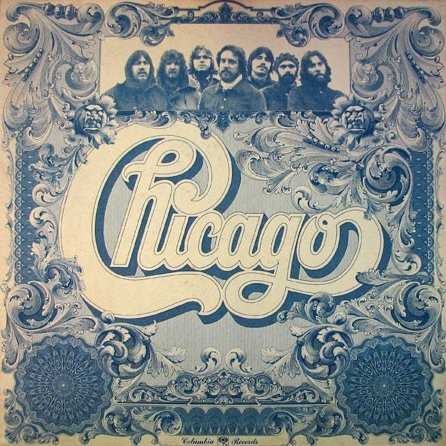 | Album: 5 of 42 Title: Chicago VI Released: 1973-06-25 Tracks: 10 Duration: 38:20 Scroll: Up Down Top Bottom 25% 50% 75% Spotify TrackSamples Allmusic Wikipedia AlbumCover | 1 Critics’ Choice (02:49) 2 Just You ’n’ Me (03:44) 3 Darlin’ Dear (02:59) 4 Jenny (03:33) 5 What’s This World Comin’ To (05:01) 6 Something in This City Changes People (03:42) 7 Hollywood (03:55) 8 In Terms of Two (03:30) 9 Rediscovery (04:50) 10 Feelin’ Stronger Every Day (04:14) |
| Chicago VI : Allmusic album Review : This is the sixth album from the jazz/pop/rock combo Chicago, and was likewise the first to be recorded at the plush, well-lit, and custom-built Caribou Studios in Nederland, CO. The facility was owned and operated by the bands manager and producer, James William Guercio, and eventually became the groups retreat for their next five (non-compilation) long-players. Another and perhaps more significant change was the incorporation of several "outside" additional musicians -- most notably Laudir De Oliveira (percussion), who would remain with the band for the next seven years and eight LPs. Although Chicago had begun as a harder-edged rock & roll band, popular music styles were undergoing a shift during the mid-70s into a decidedly more middle-of-the-road (MOR) and less-aggressive sound. This is reflected in the succinct pop and light rock efforts, contrasting the earlier lengthy and multi-movement epics that filled their earlier works. Nowhere is this more evident than on Chicago VIs (1973) two Top Ten singles: the easygoing James Pankow (trombone) ballad "Just You & Me" as well as the up-tempo rocker "Feelin Stronger Every Day," which Pankow co-wrote with Peter Cetera (vocal/bass). This more melodic and introverted sensibility pervades the rest of the disc as well -- especially from Robert Lamm (keyboard/vocals), who is particularly prolific, penning half of the material on the disc. Even his sardonically titled "Critics Choice" -- which is undoubtedly a musical rebuttal to Chicagos increasingly negative critical assessment -- is a languid and delicate response, rather than a full-force confutation. "Darlin Dear" -- another Lamm contribution -- on the other hand, is a horn-fuelled rocker that actually recalls Little Feat more than it does most of Chicagos previous sides. Compositions from other bandmembers include the heartfelt Terry Kath (guitar/vocals) ballad "Jenny," which features some fluid fretwork much in the same vein as that of Jimi Hendrixs "Angel" or "Castles Made of Sand." Additionally, Peter Ceteras (bass/vocals) "In Terms of Two" includes a more down-home and countrified acoustic vibe. While Chicago VI is an undeniably strong effort -- supported at the time by its chart-topping status -- many bandmembers and longtime enthusiasts were beginning to grow apart from the lighter, pop-oriented material. | ||
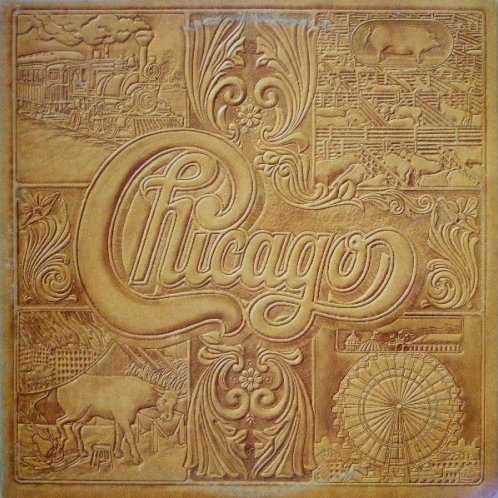 | Album: 6 of 42 Title: Chicago VII Released: 1974-03-11 Tracks: 16 Duration: 1:17:56 Scroll: Up Down Top Bottom 25% 50% 75% Spotify TrackSamples Allmusic Wikipedia AlbumCover | 1 Prelude to Aire (02:47) 2 Aire (06:30) 3 Devil’s Sweet (10:03) 4 Italian From New York (04:14) 5 Hanky Panky (01:53) 6 Life Saver (05:19) 7 Happy Man (03:16) 8 (I’ve Been) Searchin’ So Long (04:29) 9 Mongonucleosis (03:29) 10 Song of the Evergreens (05:23) 11 Byblos (06:19) 12 Wishing You Were Here (04:36) 13 Call on Me (04:03) 14 Woman Don’t Want to Love Me (04:37) 15 Skinny Boy (05:11) 16 Byblos (rehearsal) (05:40) |
| Chicago VII : Allmusic album Review : Although commercially successful, Chicagos previous long-player, Chicago VI (1973), had not been received as warmly from both the critics as well as from some bandmembers. Both parties expressed their dissatisfaction with the lighter fare and significantly shorter material. In response, the combo briefly returned to their previously tried and true methodology on their follow-up album. As such, Chicago VII (1974) was not only a double LP, but much of the effort likewise returned them to their former jazz/rock glory while continuing the middle-of-the-road (MOR) ethos that was concurrently impacting the pop charts. Nowhere is this more evident than the trio of sides extracted as singles -- including the Top Ten hits "(Ive Been) Searching So Long," "Call on Me," and "Wishing You Were Here." The latter of which features some stunning backing vocals from Beach Boys Dennis Wilson, Carl Wilson, and Alan Jardine. The group were continuing in their incorporation of additional musicians, most notably Laudir DeOliveira (percussion) and David J. Wolinski (ARP synthesizer) -- both of whom are prominently featured throughout the sides. The opening instrumentals, including "Prelude to Aire," "Aire," and "Devils Sweet," reflect Daniel Seraphines (drums) tremendously underrated skills as a writer as well as the combos recently underutilized talents as ensemble musicians. All three tracks provide a brilliant showcase for the brass/woodwind section(s) to flex their respective muscles, drawing heavily upon the styles of Weather Report and to some extent Miles Davis and Santana. The nature of their seemingly experimental fusion is stretched out even further on "Italian From New York." The cut includes some interesting ARP interjections from Robert Lamm, whose decidedly free-form contributions weave alongside some rubbery and liquefied fretwork courtesy of Terry Kath (guitar/vocals). His lead bobs around Lamms synthesizer and an equally prominent cool-toned Fender Rhodes keyboard bed. The second half of Chicago VII directly contrasts the less structured instrumentals with more inclusive sides such as the previously mentioned hits "Call On Me" and "Wishing You Were Here." Other highlights include Lamms funky mid-tempo "Life Saver," Peter Ceteras (bass/vocals) laid-back and unencumbered "Happy Man," and a double shot from Kath in the form of two serene ballads, "Song of the Evergreens" and "Byblos" -- which features some stellar acoustic strumming. This collection would be Chicagos final two-disc set by the original lineup and offers the best of the band as improvisational instrumentalists as well as concise, emotive vocalists and song crafters. | ||
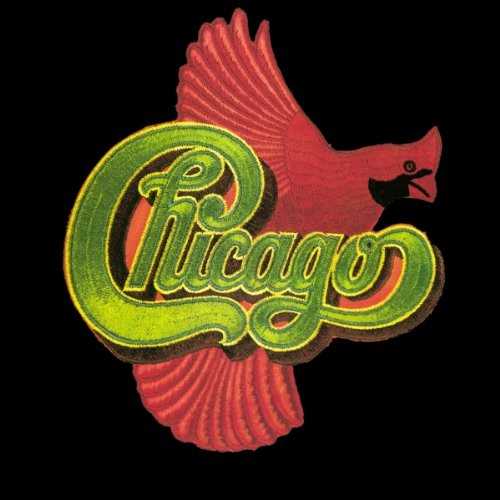 | Album: 7 of 42 Title: Chicago VIII Released: 1975-03-24 Tracks: 10 Duration: 39:27 Scroll: Up Down Top Bottom 25% 50% 75% Spotify TrackSamples Allmusic AlbumCover | 1 Anyway You Want (03:40) 2 Brand New Love Affair (04:30) 3 Never Been in Love Before (04:10) 4 Hideaway (04:46) 5 Till We Meet Again (02:05) 6 Harry Truman (03:02) 7 Oh, Thank You Great Spirit (07:20) 8 Long Time No See (02:49) 9 Aint It Blue (03:31) 10 Old Days (03:30) |
| Chicago VIII : Allmusic album Review : Road-weary and running low on steam, the members of Chicago began tinkering with their formula on the nostalgic Chicago VIII. Robert Lamm continued to loosen his grip on the songwriting, allowing Peter Cetera, Terry Kath, and James Pankow to pen the majority of the album. The enthusiasm and drive that the band had displayed on their previous efforts was audibly escaping them, best exemplified by the lazy drawl that Cetera affects on his otherwise rocking "Anyway You Want." Finally, the jazz tinges continued to appear less and less, replaced by a brassy R&B; approach that provides a more rigid structure for their tunes. But these factors dont necessarily count against the band, as many songs have a lazy, late-afternoon feel that provides a few feel-good moments. Pankows "Brand New Love Affair -- Part I & II" is a smooth, light rock ballad that Terry Kath wraps his soulful voice around, transforming it into a brooding lament on lost love. This track also begins to incorporate the multi-vocalist approach that would become the trademark of their 80s work, as the second half of the song is sung by Cetera and Lamm as well. Kaths "Oh, Thank You Great Spirit" is another winner, as his delicate vocals drift along on a sparse and psychedelic (for Chicago at least) sea of guitars. Pankows "Old Days" may be the only other notable track, a powerful rocker that showcases his tight compositional skills and provided the band with the only memorable hit song from the record. Lamms contributions are the least-commercial songs, as his arty and dynamic tracks are nostalgic entries that show him moving in an atypical direction lyrically and musically. Only his "Harry Truman" really connects, and the instrumental tributes to Depression-era jazz and the goofy singalong ending manage to render the song silly before it can really sink in. Although not terrible by any means, Chicago VIII is heavily burdened by their obvious desire to take a break. The band hits upon some wonderful ideas here, but they are simply too weary to follow them up, and the resulting album has none of the tight orchestration that reigns in their more ridiculous tendencies. | ||
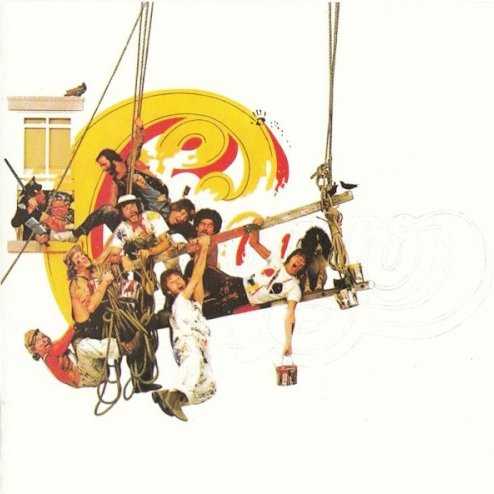 | Album: 8 of 42 Title: Chicago IX: Chicago’s Greatest Hits Released: 1975-11-10 Tracks: 11 Duration: 47:14 Scroll: Up Down Top Bottom 25% 50% 75% Spotify Wikipedia Allmusic AlbumCover | 1 25 or 6 to 4 (04:52) 2 Does Anybody Really Know What Time It Is? (03:22) 3 Colour My World (03:01) 4 Just You ’n’ Me (03:44) 5 Saturday in the Park (03:55) 6 Feelin’ Stronger Every Day (04:14) 7 Make Me Smile (03:02) 8 Wishing You Were Here (04:36) 9 Call on Me (04:03) 10 (I’ve Been) Searchin’ So Long (04:29) 11 Beginnings (07:51) |
| Chicago IX: Chicago’s Greatest Hits : Allmusic album Review : Does anyone need another Chicago album besides this one? For the casual fan, the answer is definitely no. The 1975 blockbuster includes all the bands hits from its prime. And while tracks like "Wishing You Were Here" and "Feelin Stronger Every Day" have worn a wee thin over the years, most of the cuts here are still topnotch. Standouts include the incomparable "Saturday in the Park," "Beginnings," and "Does Anybody Really Know What Time It Is?" When rock grew up with horns, jazz charts, and chops. Not as snide as Steely Dan or as soulful as Blood, Sweat & Tears, Chicago still delivered with the 11 fine sides heard here. | ||
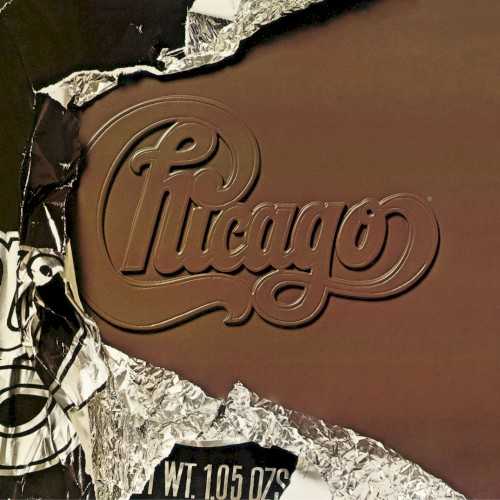 | Album: 9 of 42 Title: Chicago X Released: 1976-06-14 Tracks: 11 Duration: 38:01 Scroll: Up Down Top Bottom 25% 50% 75% Spotify TrackSamples Wikipedia Allmusic AlbumCover | 1 Once or Twice (03:02) 2 You Are on My Mind (03:23) 3 Skin Tight (03:21) 4 If You Leave Me Now (03:55) 5 Together Again (03:53) 6 Another Rainy Day in New York City (03:03) 7 Mama Mama (03:33) 8 Scrapbook (03:32) 9 Gently I’ll Wake You (03:36) 10 You Get It Up (03:36) 11 Hope for Love (03:04) |
| Chicago X : Allmusic album Review : Although it was their tenth release Chicago X (1976) was actually the bands eighth studio effort -- as Chicago IV (1972) had been a live set from Carnegie Hall and Chicago IX (1975), which precedes this disc, was their first best-of collection. Musically, the combo had effectively abandoned their extended free-form jazz leanings for more succinct pop songs. That is not to say that the band couldnt rock, because they could as evidenced by the Terry Kath (guitar/vocals) full-tilt rave-up "Once or Twice," which commences the album. The hot brass section bows deeply and respectfully to their Muscle Shoals counterparts as Kath does his best funky Otis Redding vocal. Showing his tremendous depth of field, Kath bookends the LP with the empowering and positive "Hope for Love." In between those two extremes are some of Chicagos best-known works -- such as Peter Ceteras (bass/vocals) chart-topping light rock epic "If You Leave Me Now" and Robert Lamms (keyboards/vocals) "Another Rainy Night in New York City." The latter side also reveals a minor motif, as it is a Latin-based song about the Big Apple. It follows in the footsteps of the improv-heavy "Italian from New York" from their previous studio effort, the fusion-filled Chicago VII (1974). Lamm contributes a few other tucked-away classics to Chicago X as well -- such as the aggressive and sexy "You Get It Up." There are also a pair from James Pankow(trombone/vocals) in the form of the syncopated "You Are on My Mind" -- which crossed over onto both the adult contemporary as well as pop music charts. His other composition is the classy brass of "Skin Tight." The upfront horn interjections and overall augmentation are akin to the sound made famous by their West Coast Tower of Power contemporaries. As a majority of their previous efforts had done -- all sans their debut -- Chicago X was a Top Ten album and "If You Leave Me Now" became a double Grammy winner, for both Best Pop Vocal Performance by a Duo Group or Chorus and Best Arrangement Accompanying Vocalist(s). The latter award was actually not given to the band, but rather to noted string arranger Jimmie Haskell and the groups longtime producer, James William Guercio. Another well-deserved Grammy was given to John Berg for his visually enticing cover art -- depicting Chicagos logo on the wrapper of what otherwise appears to be a Hershey chocolate bar. As the disc was released in the summer of the U.S. bicentennial (1976), the all-American image was undoubtedly and duly noted. | ||
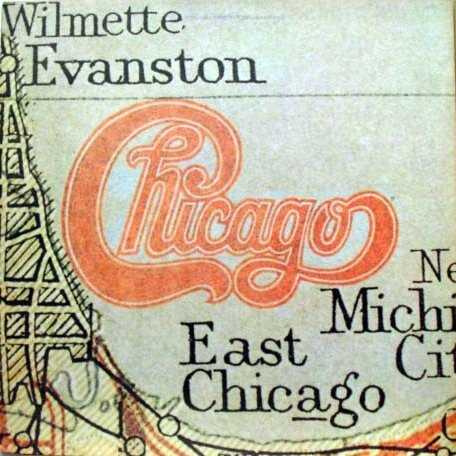 | Album: 10 of 42 Title: Chicago XI Released: 1977-09-12 Tracks: 13 Duration: 52:14 Scroll: Up Down Top Bottom 25% 50% 75% Spotify TrackSamples Allmusic Wikipedia AlbumCover | 1 Mississippi Delta City Blues (04:41) 2 Baby, What a Big Surprise (03:05) 3 Till the End of Time (04:48) 4 Policeman (04:02) 5 Take Me Back to Chicago (05:16) 6 Vote for Me (03:47) 7 Takin It on Uptown (04:47) 8 This Time (04:46) 9 The Inner Struggles of a Man (02:43) 10 Prelude (Little One) (00:52) 11 Little One (05:41) 12 Wish I Could Fly (rehearsal) (03:46) 13 Paris (rehearsal) (03:54) |
| Chicago XI : Allmusic album Review : Chicago XI (1977) was the final studio effort to feature the original septet, who by this time had been performing and recording for nearly a decade. In late January 1978, founding member Terry Kath (guitar/vocals) accidentally and fatally shot himself, forever altering the bands sound and indeed much of the combos tenacious rock & roll heart. It is somewhat fitting that their ninth studio release (11th overall) contains two Kath compositions as well as a pair of additional lead vocals. The funky, up-tempo "Mississippi Delta Blues" opens the album with a showcase of his writing and performance skills. The more aggressive "Takin It On Uptown" is a gritty rocker that further demonstrates Kaths unparalleled fret board prowess. These tougher tracks are counterbalanced by another round of light pop balladry from the usual suspects of Peter Cetera (bass/vocals), whose "Baby, What a Big Surprise" was the perfect Top Ten follow-up to his chart-topping and two-time Grammy-winning "If You Leave Me Now" from Chicago X (1976). Although undeniably successful, the group had become somewhat predictable as well. This, along with the increasingly schizophrenic popular music trend toward both disco and punk, simultaneously stifled the albums other lightweight fare, such as Daniel Seraphines "Take Me Back to Chicago" or his slightly darker and more heavily orchestrated "Little One," featuring a truly emotive lead vocal from Kath. Speaking of orchestration, Chicago XI also includes a full-blown mini symphony courtesy of noted West Coast arranger Dominic Frontiere, whose résumé includes contributions to artists as far afield as Booker T. & the M.G.s and Dan Fogelberg to Eartha Kitt or Bing Crosby. On this album, he not only adds well-placed strings to the hit "Baby, What a Big Surprise," but also the more inclusive instrumental "The Inner Struggles of a Man" and the "Prelude" to "Little One." Also worth mentioning are James Pankows soulful pop ballad "Till the End of Time," which is pulled off with a sonic finesse reminiscent of "Big" Al Anderson during his NRBQ days. Adding to the hauntingly familiar refrain are some sweet vocal inflections and a brassy horn section, who supply a laid-back and understated bed not unlike that of the Qs Whole Wheat Horns. Another blow was dealt to the bands internal structure by way of their somewhat acrimonious split with producer and (at least in the beginning) musical mentor James William Guercio -- under whose direction Chicago had been "discovered." Long-existing struggles between the band and management included the predicable and arguable overuse of the distinct Cola-Cola-inspired "Chicago" logo and Roman numeral cataloging -- both of which had prominently graced the cover of every single band release thus far. Additional and much less visible conflicts also existed between bandmembers and their producer as well. Fortunately, the spirit of Chicago would re-emerge under the direction of famed soundsmith Phil Ramone for their next effort, Hot Streets (1978). | ||
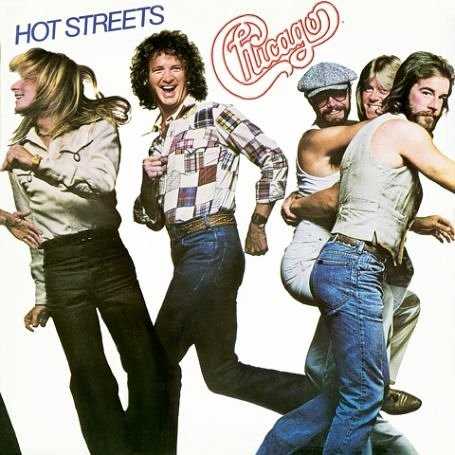 | Album: 11 of 42 Title: Hot Streets Released: 1978-10-02 Tracks: 10 Duration: 41:44 Scroll: Up Down Top Bottom 25% 50% 75% Spotify TrackSamples Allmusic Wikipedia AlbumCover | 1 Alive Again (04:11) 2 The Greatest Love on Earth (03:18) 3 Little Miss Lovin (04:36) 4 Hot Streets (05:22) 5 Take a Chance (04:44) 6 Gone Long Gone (03:59) 7 Aint It Time (04:14) 8 Love Was New (03:32) 9 No Tell Lover (04:16) 10 Show Me the Way (03:30) |
| Hot Streets : Allmusic album Review : Although Chicago tragically marked its decade anniversary with the bitter loss of lead guitarist Terry Kath, Hot Streets (1978) was not only the first release without him, it was also the bands initial offering away from James William Guercio -- with whom the group had worked on every one of its previous dozen long-players. Donnie Dacus (guitar/vocals) was brought in to fill Kaths formidable shoes. His maiden voyage would likewise mark the beginning of a downward spiral in terms of the string of hits that was usually associated with Chicago albums. Both the upbeat and pumping opener "Alive Again" and the typical adult contemporary balladry of "No Tell Lover" became their last Top 40 hits for nearly four years. Phil Ramones production gives the material an added and noticeable bite. The Peter Cetera (bass/vocals) rocker "Little Miss Lovin" recalls the bands earliest sides by blending an aggressive backbeat with a funky and soulful rhythm. "Gone, Long, Gone," the discs other Cetera contribution, also stands out for Dacus spot-on slide guitar intonation, which mimics a similar style used most notably by George Harrison. Although it failed to chart when extracted as a single, Robert Lamms (keyboards/vocals) "Love Was New" is one of the more jazz-influenced tunes on Hot Streets. The laid-back groove effortlessly carries the melody behind a fusion of light rock and contemporary jazz. The rapidly changing pop music landscape, whose horizons would embrace disco and new wave, would all but abandon Chicago for the groups next few albums. Although the band attempted to adapt to the trends, it would be four LPs and four years before Chicago would re-emerge in full form on its comeback, Chicago 16 (1982). | ||
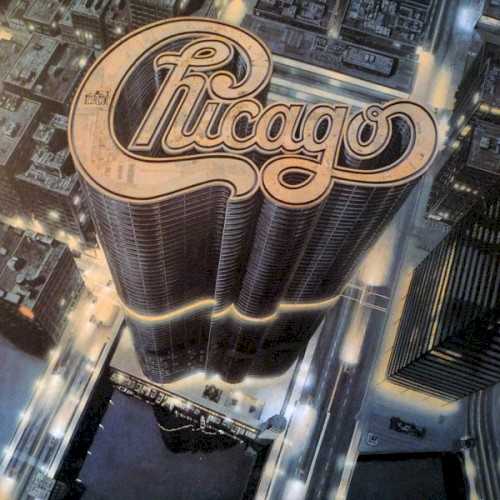 | Album: 12 of 42 Title: Chicago 13 Released: 1979-08-13 Tracks: 12 Duration: 1:00:43 Scroll: Up Down Top Bottom 25% 50% 75% Spotify TrackSamples Allmusic Wikipedia AlbumCover | 1 Street Player (09:10) 2 Mama Take (04:14) 3 Must Have Been Crazy (03:24) 4 Window Dreamin’ (04:11) 5 Paradise Alley (03:42) 6 Aloha Mama (04:11) 7 Reruns (04:30) 8 Loser With a Broken Heart (04:43) 9 Life Is What It Is (04:37) 10 Run Away (04:19) 11 Closer to You (04:54) 12 Street Player (dance mix) (08:44) |
| Chicago 13 : Allmusic album Review : While it might be a stretch to claim that disco in effect killed Chicago, as this effort exemplifies, the dance craze certainly didnt help the band, either. After the moderate success of its previous long player, Hot Streets (1978), Chicago seemed to have the fortitude to carry on in the wake of the tragic loss of original member Terry Kath (lead guitar/vocals). With the addition of Donnie Dacus (guitar/vocals) and producer Phil Ramone, Chicago scored a pair of strong Top 40 hits with "No Tell Lover" and "Alive Again." By mid-1979, the fickle pop music tides had fully turned toward the beat-intensive drone of disco. Somewhere along the line the rhythm temporarily fixated the band -- much in the same way a deer reacts to oncoming headlights. As Chicago 13 (1979) proves, the results in either instance are not pretty. The nine-plus minute "extended" opener, "Street Player," could easily be mistaken for a Village People number. The same fate befalls the overtly funky and urban-influenced "Paradise Alley." Interestingly, the latter was originally slated as the title track from a concurrent Sylvester Stallone snoozer of the same name. The disc does contain a few redeeming moments, however. Laudir DeOliveira (percussion) contributes the breezy, jazz-flavored "Life Is What It Is." Featuring an equally liberating vocal from Peter Cetera (bass/vocals), it includes one of the more tasteful horn arrangements on the album. The ragtime blues feel on Danny Seraphines (drums) "Aloha Mama" has some well-seasoned brass augmentation, proving that Chicago had not completely abandoned its roots or audience. | ||
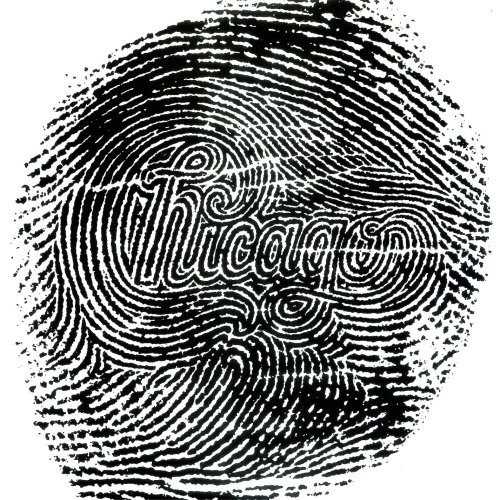 | Album: 13 of 42 Title: Chicago XIV Released: 1980-07-21 Tracks: 13 Duration: 49:42 Scroll: Up Down Top Bottom 25% 50% 75% Spotify TrackSamples Allmusic Wikipedia AlbumCover | 1 Manipulation (03:46) 2 Upon Arrival (03:49) 3 Song for You (03:41) 4 Where Did the Lovin Go (04:05) 5 Birthday Boy (04:55) 6 Hold On (04:15) 7 Overnight Cafe (04:18) 8 Thunder and Lightning (03:32) 9 Id Rather Be Rich (03:08) 10 The American Dream (03:23) 11 Doin Business (03:31) 12 Live It Up (03:23) 13 Soldier of Fortune (03:50) |
| Chicago XIV : Allmusic album Review : Despite containing a few hidden gems, Chicagos 14th long player went primarily unnoticed when first released in the summer of 1980. The concurrently popular music styles of new wave and punk, as well as the last remnants of disco, had all but abandoned the septets dependably horn-driven pop and dramatic balladry. In retrospect, it seems that the band had not yet recovered from the tragic loss of Terry Kath (guitar) less than two years earlier. Although his role had decreased somewhat by the mid-70s, Kath continued to provide Chicago with both a stabilizing spirit as well as a unifying sound. Former Stephen Stills sideman Donnie Dacus (guitar) helped out on the definitely unlucky release Chicago 13 (1979). However, he had already jumped ship before the band began working on Chicago XIV (1980) and Chris Pinnick (guitar) soon became the combos third guitarist in as many years, and after a decade with the same primary personnel. On top of that and despite ten years of significant successes, Chicago was no longer considered a top priority by its record label. This significant lack of direction resulted in one of the groups more unfocused entries. The vast majority of the albums material came from either the Peter Cetera (bass/vocals) or Robert Lamm (keyboards/vocals) camps. While the pair had long been considered Chicagos strongest respective songwriters, Cetera in particular was emerging with a definitive and soulful delivery especially notable on "Song for You" and "Overnight Café," though he bails on the half-baked "Hold On." Conversely, Lamms "Manipulation" is a strong and aggressive opener, yet any initial momentum quickly dissipates with lesser sides such as "Upon Arrival" or the tongue-in-cheek "Id Rather Be Rich." A decidedly more successful outing from Cetera, Lamm, and Danny Seraphine (drums) is "Thunder and Lightning" -- which is highlighted by some jazzy chord changes reminiscent of Steely Dans "Fez" or "Josie." | ||
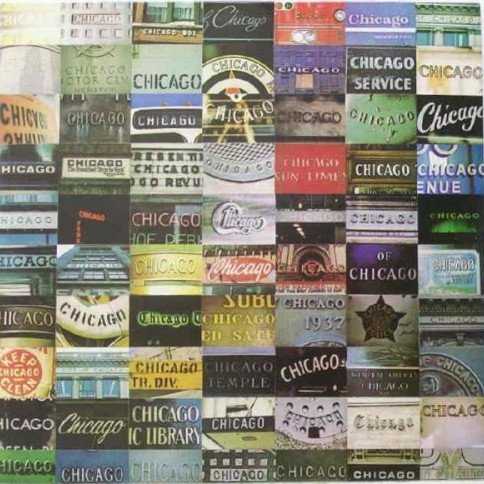 | Album: 14 of 42 Title: Greatest Hits, Volume II Released: 1981-11-23 Tracks: 10 Duration: 35:51 Scroll: Up Down Top Bottom 25% 50% 75% Wikipedia AlbumCover | 1 Baby, What a Big Surprise (03:05) 2 Dialogue (Part II) (04:11) 3 No Tell Lover (03:52) 4 Alive Again (03:34) 5 Old Days (03:30) 6 If You Leave Me Now (03:55) 7 Questions 67 & 68 (03:28) 8 Happy Man (03:16) 9 Gone Long Gone (03:59) 10 Take Me Back to Chicago (02:57) |
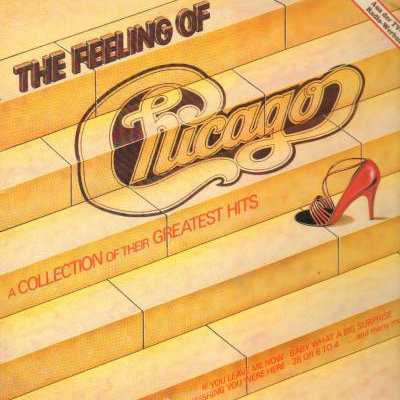 | Album: 15 of 42 Title: The Feeling of Chicago: A Collection of Their Greatest Hits Released: 1982 Tracks: 11 Duration: 42:27 Scroll: Up Down Top Bottom 25% 50% 75% AlbumCover | 1 If You Leave Me Now (03:53) 2 Saturday in the Park (03:56) 3 Feelin’ Stronger Every Day (04:15) 4 (I’ve Been) Searchin’ So Long (04:30) 5 25 or 6 to 4 (04:52) 6 Baby What a Big Surprise (03:04) 7 Wishing You Were Here (04:36) 8 No Tell Lover (03:51) 9 Another Rainy Day in New York City (02:58) 10 Does Anybody Really Know What Time It Is? (02:53) 11 Song for You (03:39) |
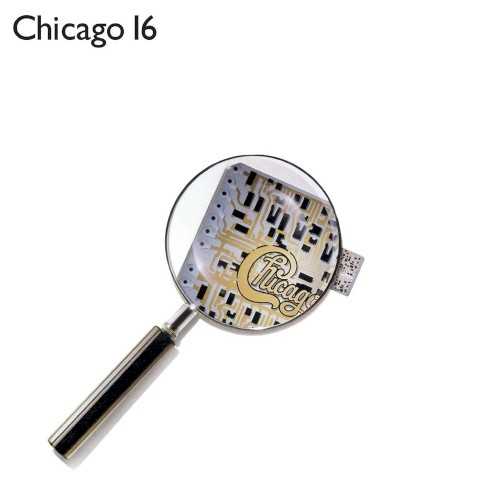 | Album: 16 of 42 Title: Chicago 16 Released: 1982 Tracks: 10 Duration: 41:50 Scroll: Up Down Top Bottom 25% 50% 75% Spotify TrackSamples Wikipedia Allmusic AlbumCover | 1 What You’re Missing (04:11) 2 Waiting for You to Decide (04:09) 3 Bad Advice (02:59) 4 Chains (03:25) 5 Hard to Say I’m Sorry / Get Away (05:07) 6 Follow Me (04:56) 7 Sonny Think Twice (04:03) 8 Rescue You (04:00) 9 What Can I Say (03:50) 10 Love Me Tomorrow (05:06) |
| Chicago 16 : Allmusic album Review : Although they had a moderate hit with 1978s Hot Streets, for all intents and purposes Chicago had been adrift since the tragic death of Terry Kath in January of 1978. Chicago 16 is where the band finally righted itself, in no small part due to the addition of guitarist/keyboardist Bill Champlin, the namesake of the 60s San Franciscan psychedelic outfit the Sons of Champlin, who in addition to joining the band brought into the circle the producer who would change Chicagos commercial fortunes: David Foster. The Canadian producer had worked with Champlin on a solo album, Runaway, which made a very small ripple on the Billboard charts upon its 1981 release, but did pave the way for the sound that Chicago developed on 16. Under the direction of Foster, Chicago turned away from any lingering jazz-rock roots they had, and they also backed away from the disco aspirations that sank their turn-of-the-decade platters. Instead, they pursued a glistening modern pop sound, anchored with dramatic drums, built on synthesizers, decked out in arena rock guitars, layered with harmonies, and stripped of any excesses -- which by and large included Chicagos famed horn section, which was now used for punctuation instead of functioning as the center of the groups sound. This was no-nonsense, all-business, crisp and clean pop for the Reagan era, and it not only became a smash hit for Chicago -- reaching the Top Ten, thanks to the singles "Hard to Say Im Sorry" and "Love Me Tomorrow" -- it defined Fosters sound, which in turned defined adult contemporary for the 80s. It may not have been too faithful to Chicago, at least what the band was in the 70s, but amidst 80s adult pop, its a high watermark -- and a lot punchier and tougher than the singles would suggest, too, since almost all of the album tracks are relatively high energy and soulful. And since this finds Foster hitting his groove as a producer, 16 is always a pleasure to listen to even when the songs themselves tend toward the forgettable. Again, its not necessarily an album for fans of Chicago the musicians, but those who love Foster the producer and the two singles on 16, this record is an entertaining period piece. | ||
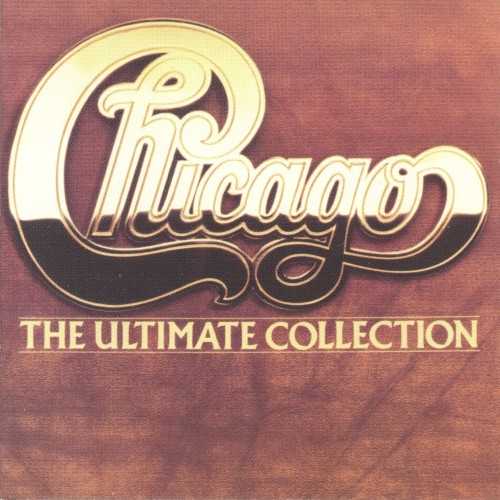 | Album: 17 of 42 Title: The Ultimate Collection Released: 1984 Tracks: 17 Duration: 1:07:44 Scroll: Up Down Top Bottom 25% 50% 75% Spotify Allmusic AlbumCover | 1 Colour My World (03:01) 2 Questions 67 & 68 (03:28) 3 No Tell Lover (03:52) 4 Old Days (03:32) 5 If You Leave Me Now (04:01) 6 25 or 6 to 4 (04:52) 7 Another Rainy Day in New York City (03:06) 8 (Ive Been) Searchin So Long (04:32) 9 Make Me Smile (single version) (03:00) 10 Im a Man (07:44) 11 Baby, What a Big Surprise (03:05) 12 Call on Me (04:03) 13 Feelin’ Stronger Every Day (04:14) 14 Does Anybody Really Know What Time It Is? (02:54) 15 Saturday in the Park (03:55) 16 Just You ’n’ Me (03:44) 17 Wishing You Were Here (04:36) |
![Allmusic album Review : Chicago 16 finally gave Chicago a big hit after a four-year drought, thanks in large part to new producer David Foster, who steered the jazz-rock veterans toward a streamlined, crisply produced pop direction on that 1982 effort. Given that success, its no surprise that the septet teamed with Foster again for its next album, 1984s Chicago 17 (apparently Roman numerals were left behind along with their progressive jazz-rock). Its also no surprise that Foster took an even greater control of 17, steering the group further down the adult contemporary road and pushing Peter Cetera toward the front of the group, while pushing the horns toward the back. Indeed, its often possible to not notice the horns on 17; they either fade into the background or meld seamlessly with the synthesizers that are the primary instruments here, providing not just the fabric but foundation of nearly all the arrangements, as synth bass and drum machines replaced the rhythm section. This did not sit well with many longtime fans -- and it may have also caused some tension within the group, since Cetera left after this album -- but it did make for the biggest hit album in Chicagos history, going quadruple platinum and peaking at number four on the Billboard charts. A big reason for its success is the pair of hit ballads in "Hard Habit to Break" and "Youre the Inspiration," two big and slick dramatic ballads that each peaked at number three on the charts and helped set the sound for adult contemporary pop for the rest of the decade; the likes of Michael Bolton and Richard Marx are unimaginable without these songs existing as a blueprint (in fact, Marx sang backup vocals on "We Can Stop the Hurtin" on 17).<br><br> Ballads were a big part of 17 -- in fact, these hits and album cuts like "Remember the Feeling" are among the first power ballads, ballads that were given arena rock flourishes and dramatic arrangements but never took the focus off the melody, so housewives and preteens alike could sing along with them. Power ballads later became the province of hair metal bands like Bon Jovi and Poison, but Fosters work with Chicago on 17 really helped set the stage for them, since he not only gave the ballads sweeping rock arrangements, but the harder, punchier tunes here play like ballads. Even when the band turns up the intensity here -- "Stay the Night" has a spare, rather ominous beat that suggests they were trying for album-oriented rock; "Along Comes a Woman" has a stiff drum loop and a hiccupping synth bass that suggests dance-pop -- the music is still slick, shiny, and soft, music that can appeal to the widest possible audience. 17 did indeed find the widest possible audience, as it ruled radio into late 1985, by which time there were plenty of imitators of Fosters style. There may have been plenty of imitators -- soon, solo Cetera was one of them, making music that was indistinguishable from this -- but nobody bettered Foster, and Chicago 17 is his pièce de résistance, a record that sounded so good it didnt quite matter that some of the material didnt stick as songs; as a production, it was the pinnacle of his craft and one of the best adult contemporary records of the 80s, perhaps the best of them all. Certainly, its hard to think of another adult contemporary album quite as influential within its style as this -- not only did it color the records that followed, but its hard not to think of Chicago 17 as the place where soft rock moved away from the warm, lush sounds that defined the style in the late 70s and early 80s and moved toward the crisp, meticulous, synthesized sound of adult contemporary pop, for better or worse, depending on your point of view. [Rhino reissued Chicago 17 in 2006 with remastered sound and a bonus track: Robert Lamms previously unreleased "Where We Begin."] chicago_17](../../images/chicago-chicago_17.jpg) | Album: 18 of 42 Title: Chicago 17 Released: 1984-05-14 Tracks: 10 Duration: 41:41 Scroll: Up Down Top Bottom 25% 50% 75% Spotify TrackSamples Allmusic Wikipedia AlbumCover | 1 Stay the Night (03:49) 2 We Can Stop the Hurtin’ (04:12) 3 Hard Habit to Break (04:44) 4 Only You (03:49) 5 Remember the Feeling (04:30) 6 Along Comes a Woman (04:16) 7 You’re the Inspiration (03:50) 8 Please Hold On (03:43) 9 Prima Donna (04:35) 10 Once in a Lifetime (04:10) |
| Chicago 17 : Allmusic album Review : Chicago 16 finally gave Chicago a big hit after a four-year drought, thanks in large part to new producer David Foster, who steered the jazz-rock veterans toward a streamlined, crisply produced pop direction on that 1982 effort. Given that success, its no surprise that the septet teamed with Foster again for its next album, 1984s Chicago 17 (apparently Roman numerals were left behind along with their progressive jazz-rock). Its also no surprise that Foster took an even greater control of 17, steering the group further down the adult contemporary road and pushing Peter Cetera toward the front of the group, while pushing the horns toward the back. Indeed, its often possible to not notice the horns on 17; they either fade into the background or meld seamlessly with the synthesizers that are the primary instruments here, providing not just the fabric but foundation of nearly all the arrangements, as synth bass and drum machines replaced the rhythm section. This did not sit well with many longtime fans -- and it may have also caused some tension within the group, since Cetera left after this album -- but it did make for the biggest hit album in Chicagos history, going quadruple platinum and peaking at number four on the Billboard charts. A big reason for its success is the pair of hit ballads in "Hard Habit to Break" and "Youre the Inspiration," two big and slick dramatic ballads that each peaked at number three on the charts and helped set the sound for adult contemporary pop for the rest of the decade; the likes of Michael Bolton and Richard Marx are unimaginable without these songs existing as a blueprint (in fact, Marx sang backup vocals on "We Can Stop the Hurtin" on 17). Ballads were a big part of 17 -- in fact, these hits and album cuts like "Remember the Feeling" are among the first power ballads, ballads that were given arena rock flourishes and dramatic arrangements but never took the focus off the melody, so housewives and preteens alike could sing along with them. Power ballads later became the province of hair metal bands like Bon Jovi and Poison, but Fosters work with Chicago on 17 really helped set the stage for them, since he not only gave the ballads sweeping rock arrangements, but the harder, punchier tunes here play like ballads. Even when the band turns up the intensity here -- "Stay the Night" has a spare, rather ominous beat that suggests they were trying for album-oriented rock; "Along Comes a Woman" has a stiff drum loop and a hiccupping synth bass that suggests dance-pop -- the music is still slick, shiny, and soft, music that can appeal to the widest possible audience. 17 did indeed find the widest possible audience, as it ruled radio into late 1985, by which time there were plenty of imitators of Fosters style. There may have been plenty of imitators -- soon, solo Cetera was one of them, making music that was indistinguishable from this -- but nobody bettered Foster, and Chicago 17 is his pièce de résistance, a record that sounded so good it didnt quite matter that some of the material didnt stick as songs; as a production, it was the pinnacle of his craft and one of the best adult contemporary records of the 80s, perhaps the best of them all. Certainly, its hard to think of another adult contemporary album quite as influential within its style as this -- not only did it color the records that followed, but its hard not to think of Chicago 17 as the place where soft rock moved away from the warm, lush sounds that defined the style in the late 70s and early 80s and moved toward the crisp, meticulous, synthesized sound of adult contemporary pop, for better or worse, depending on your point of view. [Rhino reissued Chicago 17 in 2006 with remastered sound and a bonus track: Robert Lamms previously unreleased "Where We Begin."] | ||
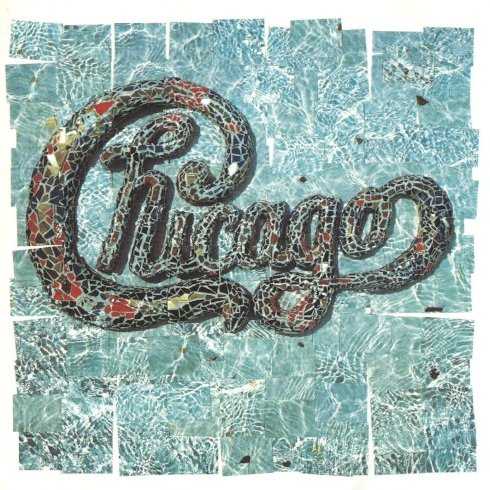 | Album: 19 of 42 Title: Chicago 18 Released: 1986-09-29 Tracks: 10 Duration: 45:20 Scroll: Up Down Top Bottom 25% 50% 75% Spotify TrackSamples Allmusic Wikipedia AlbumCover | 1 Niagara Falls (03:46) 2 Forever (05:19) 3 If She Would Have Been Faithful… (03:51) 4 25 or 6 to 4 (04:21) 5 Will You Still Love Me? (05:43) 6 Over and Over (04:19) 7 It’s Alright (04:29) 8 Nothins Gonna Stop Us Now (04:52) 9 I Believe (04:23) 10 One More Day (04:13) |
| Chicago 18 : Allmusic album Review : Chicago 17 was a peak for the 80s incarnation of Chicago, the ideal blend of Peter Ceteras adult-pop craft and David Fosters slick yet lush production, an album that spawned four huge singles and went platinum six times, turning it into their biggest hit ever. There was nowhere to go but down but there was little indication how far Chicago 18 would take them. Cetera decided that the blockbuster success of Chicago 17 would be a perfect launching pad for a solo career, so he bolted prior to the recording of 18 -- but the band didnt pause, hiring Jason Scheff as his replacement and retaining Foster as producer in the hopes of replicating the success of its predecessor. Certainly, Chicago 18 is within the vein of 17 but there are some crucial differences, all stemming from the departure of Cetera. Without him, a certain warmth is missing, both in the writing and in the sound, as all the smooth soft sounds turn into something strident and slick. Fosters production relies too heavily on stiff synthesized sounds and boomy echoes; everything is pushed to the front, so its not easy to sink into the production, the way it was on 17. This, along with a severe drought in good new songs -- only the by-committee power ballad "Will You Still Love Me?" works in this context (the other hit single, "If She Would Have Been Faithful...," has just too weird a conceit to work) -- is a greater detriment than the utterly anonymous Scheff, who performs his role as the stand-in Cetera ably. He slips into the allotted spaces in Fosters production, never standing out from the wall of sound -- and neither does Chicago as a band, either, even if they try so mightily to assert their identity that they revive "25 or 6 to 4," a misguided move that only reveals that theyre not in control here, Foster is. | ||
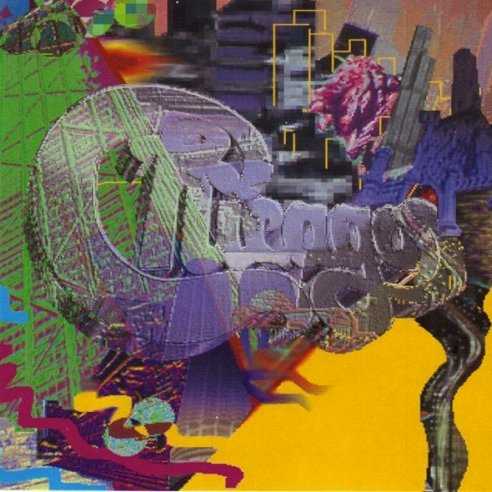 | Album: 20 of 42 Title: Chicago 19 Released: 1988-06-20 Tracks: 10 Duration: 44:18 Scroll: Up Down Top Bottom 25% 50% 75% Spotify Wikipedia Allmusic AlbumCover | 1 Heart in Pieces (05:05) 2 I Don’t Wanna Live Without Your Love (03:56) 3 I Stand Up (04:07) 4 We Can Last Forever (03:44) 5 Come in From the Night (04:43) 6 Look Away (04:03) 7 What Kind of Man Would I Be? (04:23) 8 Runaround (04:11) 9 You’re Not Alone (03:59) 10 Victorious (06:02) |
| Chicago 19 : Allmusic album Review : Chicago 19 contained four Top Ten hits, "I Dont Wanna Live Without Your Love," "Look Away" (which hit number one), "Youre Not Alone," and "What Kind of Man Would I Be?," yet did not reach the Top Ten on the album list, definite proof that Chicago was reaching an easy listening, (or adult contemporary) radio audience but missing the rock audience. It paid the bills, though. | ||
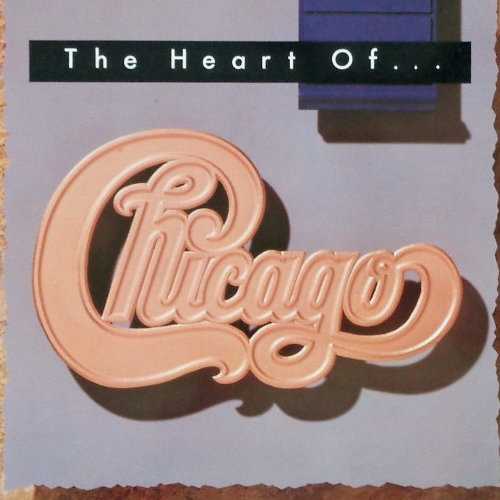 | Album: 21 of 42 Title: The Heart of Chicago Released: 1989 Tracks: 15 Duration: 1:05:41 Scroll: Up Down Top Bottom 25% 50% 75% Spotify AlbumCover | 1 If You Leave Me Now (03:55) 2 Baby, What a Big Surprise (03:05) 3 Where Did the Lovin Go (04:05) 4 Take Me Back to Chicago (05:16) 5 Hard to Say Im Sorry (05:07) 6 Love Me Tomorrow (05:06) 7 Hard Habit to Break (04:44) 8 Only You (03:54) 9 You’re the Inspiration (03:50) 10 Along Comes a Woman (04:16) 11 Remember the Feeling (04:30) 12 If She Would Have Been Faithful… (03:51) 13 Will You Still Love Me? (05:43) 14 What Kind of Man Would I Be? (single version) (04:14) 15 Look Away (04:00) |
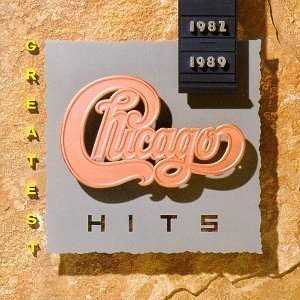 | Album: 22 of 42 Title: Greatest Hits 1982-1989 Released: 1989-11-21 Tracks: 12 Duration: 52:29 Scroll: Up Down Top Bottom 25% 50% 75% Wikipedia Allmusic AlbumCover | 1 Hard to Say I’m Sorry / Get Away (05:07) 2 Look Away (04:03) 3 Stay the Night (03:49) 4 Will You Still Love Me? (05:43) 5 Love Me Tomorrow (05:06) 6 What Kind of Man Would I Be? (remix) (04:16) 7 You’re the Inspiration (03:50) 8 I Don’t Wanna Live Without Your Love (03:56) 9 Hard Habit to Break (04:44) 10 Along Comes a Woman (04:16) 11 If She Would Have Been Faithful… (03:51) 12 We Can Last Forever (03:44) |
| Greatest Hits 1982-1989 : Allmusic album Review : Chicago returned from a career dip in 1982 with "Hard to Say Im Sorry" and continued to hit with power ballads, among them "Hard Habit to Break" and "Youre the Inspiration," all sung by Peter Cetera. But the streak continued after Cetera departed in 1985, as Jason Scheff stepped in and Chicago went on to score hits like "Will You Still Love Me?," "I Dont Wanna Live Without Your Love," and "Look Away," which are all heard here. | ||
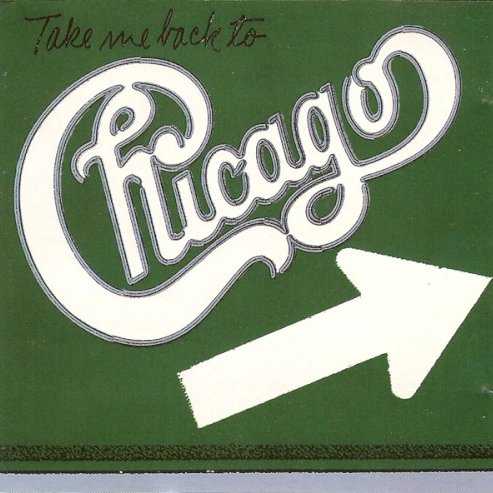 | Album: 23 of 42 Title: Take Me Back to Chicago Released: 1990 Tracks: 10 Duration: 39:21 Scroll: Up Down Top Bottom 25% 50% 75% Allmusic Wikipedia AlbumCover | 1 Baby, What a Big Surprise (03:05) 2 Happy Man (03:16) 3 Take Me Back to Chicago (05:19) 4 If You Leave Me Now (03:55) 5 Old Days (03:30) 6 Song for You (03:41) 7 Thunder and Lightning (03:32) 8 Wishing You Were Here (04:36) 9 Mama Take (04:07) 10 Run Away (04:17) |
| Take Me Back to Chicago : Allmusic album Review : Another pointless rip-off compilation by Columbia Records and this one doesnt even contain any big hits. | ||
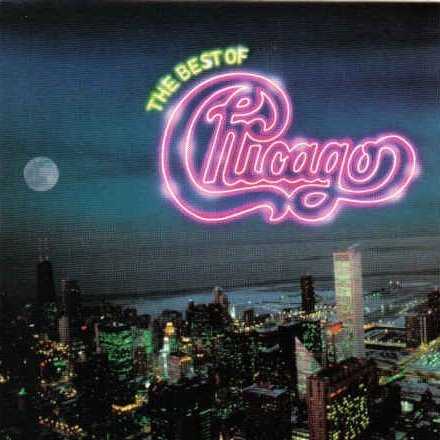 | Album: 24 of 42 Title: The Best of Chicago Released: 1991 Tracks: 12 Duration: 51:50 Scroll: Up Down Top Bottom 25% 50% 75% Spotify Allmusic AlbumCover | 1 If You Leave Me Now (03:55) 2 Baby What a Big Surprise (03:02) 3 Take Me Back to Chicago (05:14) 4 Hard to Say Im Sorry (05:07) 5 Love Me Tomorrow (05:06) 6 Hard Habit to Break (04:44) 7 Youre the Inspiration (03:48) 8 Along Comes a Woman (04:16) 9 Remember the Feeling (04:30) 10 If She Would Have Been Faithful (03:51) 11 What Kind of Man Would I Be? (single version) (04:14) 12 Look Away (04:01) |
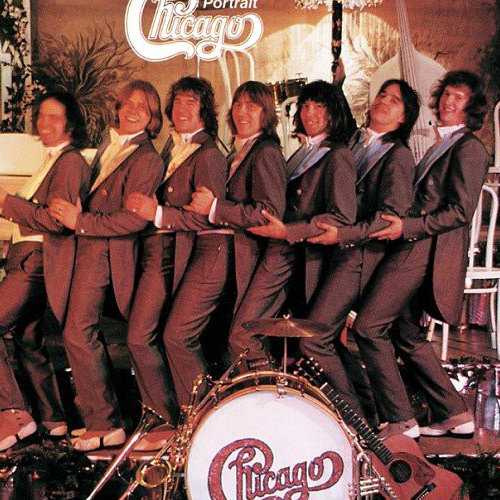 | Album: 25 of 42 Title: Group Portrait Released: 1991 Tracks: 63 Duration: 4:12:38 Scroll: Up Down Top Bottom 25% 50% 75% Wikipedia AlbumCover | 1 Introduction (06:35) 2 Does Anybody Really Know What Time It Is? (04:35) 3 Beginnings (07:55) 4 Questions 67 & 68 (05:02) 5 Listen (03:20) 6 Poem 58 (08:37) 7 I’m a Man (07:41) 8 Make Me Smile (03:29) 9 So Much to Say, So Much to Give (01:01) 10 Anxietys Moment (00:56) 11 West Virginia Fantasies (01:33) 12 Colour My World (03:01) 13 To Be Free (01:30) 14 Now More Than Ever (01:11) 15 Fancy Colors (05:12) 16 25 or 6 to 4 (04:52) 17 Where Do We Go From Here (02:48) 1 Flight 602 (02:44) 2 Free (02:15) 3 What Else Can I Say (03:14) 4 Mother (04:30) 5 Lowdown (03:37) 6 A Song for Richard and His Friends (06:25) 7 A Hit by Varèse (04:53) 8 Saturday in the Park (03:55) 9 Dialogue, Part I (02:56) 10 Dialogue, Part II (04:14) 11 Alma Mater (03:51) 12 Feelin’ Stronger Every Day (04:14) 13 In Terms of Two (03:30) 14 Critics’ Choice (02:49) 15 Just You ’n’ Me (03:44) 16 Something in This City Changes People (03:42) 1 Life Saver (05:19) 2 Happy Man (03:32) 3 (I’ve Been) Searchin’ So Long (04:29) 4 Sunny Boy (05:11) 5 Byblos (06:19) 6 Wishing You Were Here (04:36) 7 Call on Me (04:03) 8 Brand New Love Affair (04:30) 9 Harry Truman (03:02) 10 Old Days (03:30) 11 You Are on My Mind (03:23) 12 If You Leave Me Now (03:55) 13 Together Again (03:53) 14 Another Rainy Day in New York City (03:03) 15 Hope for Love (03:04) 1 Take Me Back to Chicago (05:16) 2 Mississippi Delta City Blues (04:41) 3 Baby, What a Big Surprise (03:05) 4 Prelude (Little One) (00:49) 5 Little One (05:47) 6 No Tell Lover (04:12) 7 Closer to You (04:56) 8 Gone Long Gone (03:59) 9 Alive Again (04:07) 10 Must Have Been Crazy (03:24) 11 Doin Business (03:27) 12 Song for You (03:41) 13 Thunder and Lightning (03:32) 14 The American Dream (03:18) 15 Beginnings (live) (06:18) |
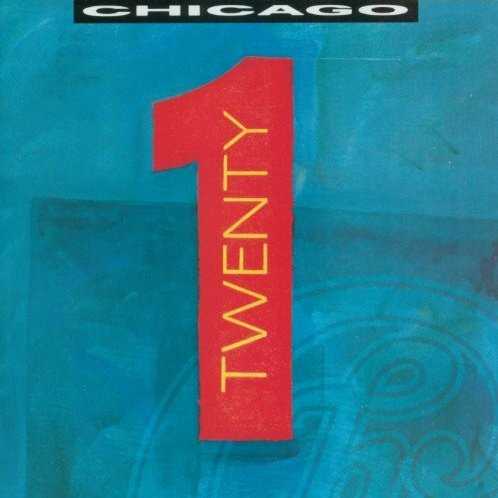 | Album: 26 of 42 Title: Twenty 1 Released: 1991-01-29 Tracks: 12 Duration: 51:58 Scroll: Up Down Top Bottom 25% 50% 75% Spotify Wikipedia Allmusic AlbumCover | 1 Explain It to My Heart (04:46) 2 If It Were You (04:42) 3 You Come to My Senses (03:48) 4 Somebody, Somewhere (04:22) 5 What Does It Take (04:38) 6 One From the Heart (04:44) 7 Chasin’ the Wind (04:18) 8 God Save the Queen (04:20) 9 Man to Woman (03:57) 10 Only Time Can Heal the Wounded (04:44) 11 Who Do You Love (03:19) 12 Holdin’ On (04:14) |
| Twenty 1 : Allmusic album Review : The 90s found Chicagos lineup minus drummer Daniel Seraphine, but with guitarist Dawayne Bailey, who had been a sideman, a full-fledged member. It also found the group at the closest thing to a career crisis in a decade. This album sold poorly and spun off only one Top 40 hit, "Chasin the Wind," despite containing some typical, if not outstanding, material in tunes like "You Come to My Senses" (which belatedly scaled the adult contemporary chart) and "Explain It to My Heart." Clearly, a new approach was in order. | ||
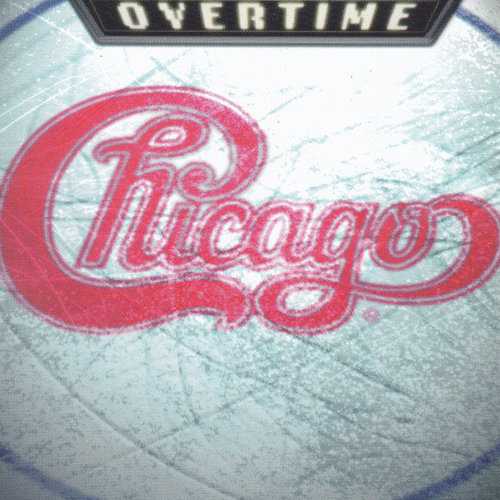 | Album: 27 of 42 Title: Overtime Released: 1995 Tracks: 24 Duration: 1:35:59 Scroll: Up Down Top Bottom 25% 50% 75% Allmusic AlbumCover | 1 Make Me Smile (02:58) 2 25 or 6 to 4 (04:52) 3 Does Anybody Really Know What Time It Is? (03:20) 4 Bigger Than Elvis (04:31) 5 Free (02:15) 6 Lowdown (03:34) 7 Beginnings (07:51) 8 Colour My World (03:01) 9 Questions 67 & 68 (03:26) 10 Saturday in the Park (live) (04:13) 11 Dialogue (Part I & II) (live) (06:43) 12 Feelin’ Stronger Every Day (04:14) 13 Just You ’n’ Me (03:44) 14 (Ive Been) Searchin So Long (04:27) 1 Stone of Sisyphus (04:10) 2 Call on Me (04:03) 3 Wishing You Were Here (04:36) 4 Harry Truman (03:02) 5 Old Days (03:30) 6 Another Rainy Day in New York City (03:03) 7 If You Leave Me Now (03:55) 8 Baby, What a Big Surprise (03:02) 9 Alive Again (03:32) 10 No Tell Lover (03:46) |
| Overtime : Allmusic album Review : In 1995, Chicago gained the rights to its recordings of the 1960s and 70s originally released on Columbia Records, and the group not only formed Chicago Records to reissue the material, but also made licensing deals internationally. One result is this 24-track, 95-minute Canadian double-CD collection, which contains every Top 40 hit Chicago achieved between 1969 and 1979. Two of those songs, "Dialogue" and "Saturday In the Park," are presented in live recordings made in Japan in 1972; the rest are the original studio recordings. The tracks boast a notably superior sound quality to that found on the old Columbia CDs, doubtlessly because the group went back to the original master tapes. But the real bonus here for Chicago fans is two recordings, "Bigger Than Elvis" and "Stone of Sisyphus," drawn from the groups unreleased 1993 album Stone of Sisyphus, which was rejected by Warner Bros. The former is bassist/singer Jason Scheffs heartfelt reflection on his father, Elvis Presley sideman Jerry Scheff, and is in the power ballad style of so many Chicago hits -- its unbelievable that a song this good has not been heard until now. The latter is also an excellent song penned by trumpeter Lee Loughnane and former Chicago guitarist DeWayne Bailey. If the rest of Stone of Sisyphus is of a similar quality, then it may be one of the better lost albums in rock history. | ||
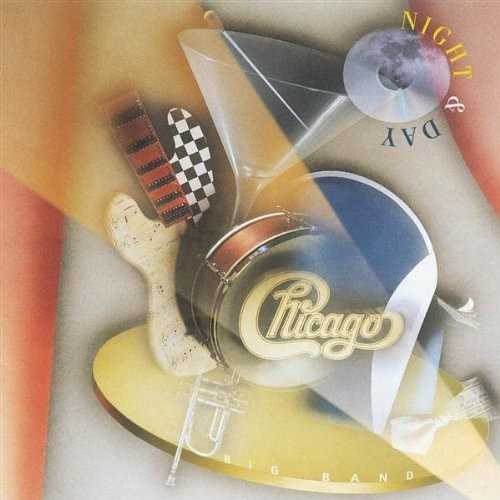 | Album: 28 of 42 Title: Night and Day: Big Band Released: 1995-05-23 Tracks: 13 Duration: 54:32 Scroll: Up Down Top Bottom 25% 50% 75% Wikipedia AlbumCover | 1 Chicago (03:07) 2 Caravan (03:23) 3 Dream a Little Dream of Me (03:13) 4 Goody Goody (04:04) 5 Moonlight Serenade (04:26) 6 Night & Day (05:35) 7 Blues in the Night (06:04) 8 Sing, Sing, Sing (03:22) 9 Sophisticated Lady (05:11) 10 In the Mood (03:43) 11 Dont Get Around Much Anymore (03:38) 12 Take the "A" Train (05:35) 13 String of Pearls (03:06) |
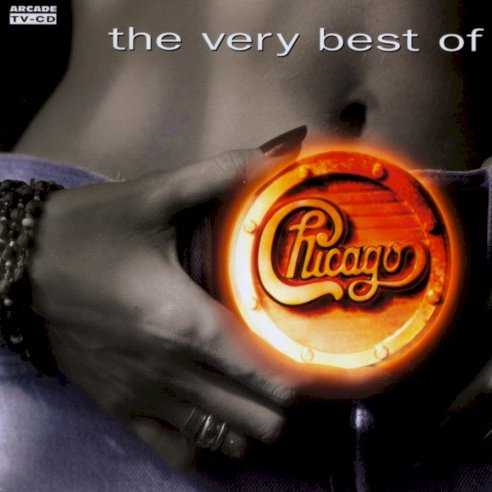 | Album: 29 of 42 Title: The Very Best of Chicago Released: 1996-02-12 Tracks: 17 Duration: 1:16:59 Scroll: Up Down Top Bottom 25% 50% 75% Spotify Allmusic AlbumCover | 1 If You Leave Me Now (03:55) 2 Baby, What a Big Surprise (03:05) 3 Saturday in the Park (03:55) 4 Wishing You Were Here (04:36) 5 25 or 6 to 4 (04:52) 6 Im a Man (07:42) 7 Feelin’ Stronger Every Day (04:14) 8 Does Anybody Really Know What Time It Is? (03:21) 9 Street Player (04:23) 10 Lowdown (03:37) 11 Take Me Back to Chicago (05:11) 12 Make Me Smile (03:02) 13 Beginnings (07:49) 14 (I’ve Been) Searchin’ So Long (04:29) 15 Questions 67 and 68 (04:52) 16 Bigger Than Elvis (04:31) 17 Let’s Take a Lifetime (03:19) |
| The Very Best of Chicago : Allmusic album Review : Originally released in 2007 as a double disc by Rhino, The Very Best of Chicago celebrates the veteran bands 40th anniversary. This single-disc version of that same collection was released a year later in conjunction with Hallmark and contains the majority of their best known hits primarily from their 1970s and 80s heyday, though the inclusion of two late-period cuts from 2006 ("Love Will Come Back" and "Feel") make this worthy of its 40th anniversary name. Longtime fans will already own most of these songs, but as a highlight reel, this collection serves as a solid introduction to Chicagos trademark "rock and roll band with horns" sound. | ||
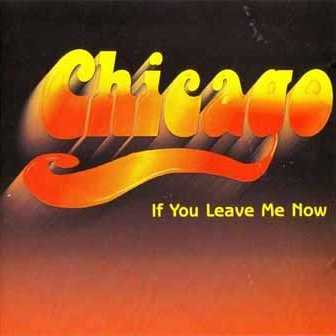 | Album: 30 of 42 Title: If You Leave Me Now Released: 1997 Tracks: 12 Duration: 55:41 Scroll: Up Down Top Bottom 25% 50% 75% AlbumCover | 1 Questions 67 & 68 (05:04) 2 Make Me Smile (03:02) 3 25 or 6 to 4 (04:52) 4 Does Anybody Really Know What Time It Is? (04:36) 5 Beginnings (07:46) 6 Saturday in the Park (03:55) 7 Wishing You Were Here (04:33) 8 If You Leave Me Now (03:55) 9 Baby, What a Big Surprise (03:02) 10 Hard to Say Im Sorry (05:07) 11 Love Me Tomorrow (05:06) 12 Hard Habit to Break (04:39) |
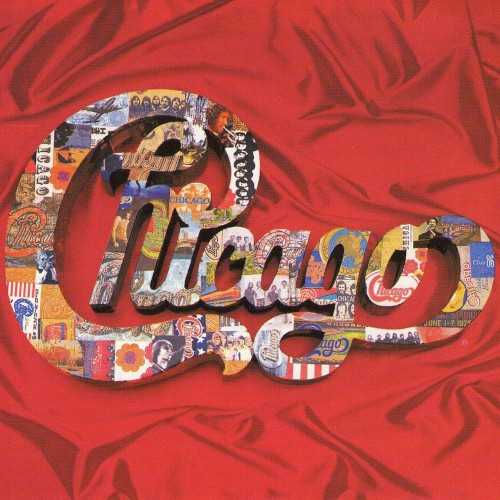 | Album: 31 of 42 Title: The Heart of Chicago 1967-1997 Released: 1997-04-22 Tracks: 15 Duration: 1:07:14 Scroll: Up Down Top Bottom 25% 50% 75% Wikipedia Allmusic AlbumCover | 1 You’re the Inspiration (03:50) 2 If You Leave Me Now (03:55) 3 Make Me Smile (03:02) 4 Hard Habit to Break (04:44) 5 Saturday in the Park (03:55) 6 Wishing You Were Here (04:36) 7 The Only One (06:01) 8 Colour My World (03:01) 9 Look Away (04:00) 10 Here in My Heart (04:14) 11 Just You ’n’ Me (03:44) 12 Does Anybody Really Know What Time It Is? (03:22) 13 Will You Still Love Me? (05:43) 14 Beginnings (07:55) 15 Hard to Say I’m Sorry / Get Away (05:07) |
| The Heart of Chicago 1967-1997 : Allmusic album Review : Heart of Chicago 1967-1997 is a cheap way to celebrate Chicagos 30th anniversary. Featuring 13 arbitrarily picked hits from throughout the bands career -- from "Saturday in the Park" and "Does Anybody Really Know What Time It Is" to "If You Leave Me Now," "Youre the Inspiration," "Hard to Say Im Sorry," and "Look Away" -- adding two new tracks, the Lenny Kravitz-produced "The Only One" and "Here in My Heart," which was co-written by Glen Ballard and James Newton Howard. Although Chicago has enlisted heavy hitters for the new tracks, both fall flat. And as a thorough hits collection, Heart of Chicago 1967-1997 is unsuccessful as well, since it omits such hits as "25 or 6 to 4" and "Baby, What a Big Surprise," yet it works well as sampler for casual fans, since it has only the biggest hits. | ||
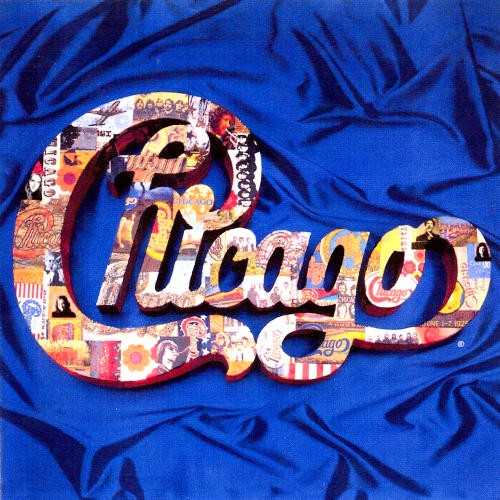 | Album: 32 of 42 Title: The Heart of Chicago 1967-1998, Volume 2 Released: 1998-05-12 Tracks: 16 Duration: 1:12:03 Scroll: Up Down Top Bottom 25% 50% 75% Wikipedia AlbumCover | 1 Dialogue (Part 1 & 2) (07:11) 2 Old Days (03:30) 3 All Roads Lead to You (04:20) 4 Love Me Tomorrow (05:00) 5 Baby, What a Big Surprise (03:05) 6 You’re Not Alone (03:59) 7 What Kind of Man Would I Be (04:19) 8 No Tell Lover (03:49) 9 Show Me a Sign (03:38) 10 (I’ve Been) Searchin’ So Long (04:29) 11 Call on Me (04:03) 12 I Don’t Wanna Live Without Your Love (03:56) 13 Feelin’ Stronger Every Day (04:14) 14 Stay the Night (03:49) 15 I’m a Man (07:41) 16 25 or 6 to 4 (04:52) |
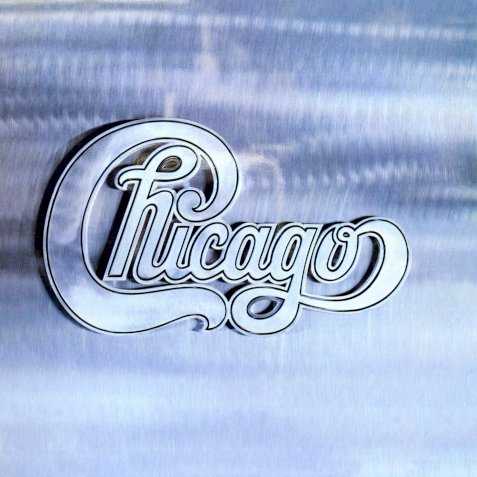 | Album: 33 of 42 Title: Chicago Released: 1998-05-26 Tracks: 12 Duration: 52:10 Scroll: Up Down Top Bottom 25% 50% 75% Spotify TrackSamples Allmusic AlbumCover | 1 25 or 6 to 4 (04:52) 2 Feelin Stronger Every Day (04:18) 3 If You Leave Me Now (04:01) 4 Take Me Back to Chicago (05:18) 5 Love Me Tomorrow (05:14) 6 Baby What a Big Surprise (03:11) 7 Stay the Night (03:56) 8 Youre the Inspiration (03:56) 9 Hard to Say Im Sorry (05:07) 10 Wishing You Were Here (04:39) 11 (Ive Been) Searchin So Long (04:32) 12 Colour My World (03:01) |
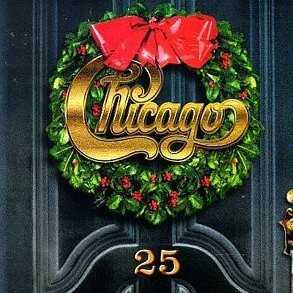 | Album: 34 of 42 Title: Chicago XXV: The Christmas Album Released: 1998-08-25 Tracks: 15 Duration: 54:16 Scroll: Up Down Top Bottom 25% 50% 75% Wikipedia AlbumCover | 1 Little Drummer Boy (04:04) 2 God Rest Ye Merry, Gentlemen (03:23) 3 Have Yourself a Merry Little Christmas (04:03) 4 The Christmas Song (03:38) 5 O Come All Ye Faithful (04:46) 6 Childs Prayer (03:24) 7 Feliz Navidad (04:18) 8 Santa Claus Is Coming to Town (03:56) 9 Christmas Time is Here (03:48) 10 Let It Snow! Let It Snow! Let It Snow! (03:28) 11 What Child Is This (04:41) 12 White Christmas (02:29) 13 Silent Night (03:18) 14 One Little Candle (01:26) 15 [unknown] (03:30) |
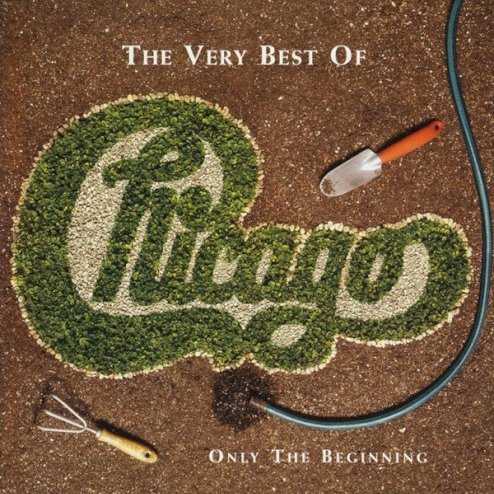 | Album: 35 of 42 Title: The Very Best of Chicago: Only the Beginning Released: 2002-07-02 Tracks: 39 Duration: 2:37:52 Scroll: Up Down Top Bottom 25% 50% 75% Spotify Wikipedia Allmusic AlbumCover | 1 Make Me Smile (new edit) (04:27) 2 25 or 6 to 4 (04:52) 3 Does Anybody Really Know What Time It Is? (new edit) (03:20) 4 Beginnings (06:27) 5 Questions 67 and 68 (04:54) 6 Im a Man (new edit) (05:44) 7 Colour My World (03:01) 8 Free (02:15) 9 Lowdown (03:37) 10 Saturday in the Park (03:55) 11 Dialogue (Part I & II) (single version) (05:00) 12 Just You ’n’ Me (03:44) 13 Feelin’ Stronger Every Day (04:14) 14 (I’ve Been) Searchin’ So Long (04:29) 15 Wishing You Were Here (04:36) 16 Call on Me (04:03) 17 Happy Man (GH2 edit) (03:16) 18 Another Rainy Day in New York City (03:03) 19 If You Leave Me Now (03:55) 1 Old Days (03:30) 2 Baby, What a Big Surprise (03:05) 3 Take Me Back to Chicago (single version) (02:58) 4 Alive Again (04:05) 5 No Tell Lover (04:13) 6 Love Me Tomorrow (single version) (03:58) 7 Hard to Say I’m Sorry / Get Away (05:07) 8 Stay the Night (03:49) 9 Hard Habit to Break (04:44) 10 You’re the Inspiration (03:50) 11 Along Comes a Woman (single version) (03:46) 12 Will You Still Love Me? (single version) (04:11) 13 If She Would Have Been Faithful… (03:51) 14 Look Away (single version) (04:01) 15 What Kind of Man Would I Be? (single version) (04:14) 16 I Don’t Wanna Live Without Your Love (03:56) 17 We Can Last Forever (single version) (03:45) 18 Youre Not Alone (single version) (03:59) 19 Chasin’ the Wind (04:18) 20 Sing, Sing, Sing (03:22) |
| The Very Best of Chicago: Only the Beginning : Allmusic album Review : Rhino began its elaborate Chicago reissue series in 2002 with The Very Best of Chicago: Only the Beginning, a double-disc set that covers 39 hits from all of Chicagos eras -- from the early jazzy records, through the soft rock hits sung by Peter Cetera, to the post-Cetera adult contemporary records of the 80s, and beyond. Its the first compilation to cover this much ground, actually -- 1991s Group Portrait stopped around Ceteras departure -- and while it may go a little bit further than some would want (a cover of Louis Primas "Sing, Sing, Sing" from their 1995 neo-swing album closes the set; it happens to feature the Gipsy Kings on support), it nevertheless is very satisfying, since it rounds up all of the hits, and Chicago were at their very best on their hits. For anybody who has been holding on to all three Greatest Hits collections, this will replace them all, since it has almost every song from all three, plus remastered sound. Indeed, this is the definitive word on the group -- perhaps a fan favorite or two is missing, but everything you need is here, in a more concise, user-friendly shape than the Group Portrait box while offering more than any of the hits collections. | ||
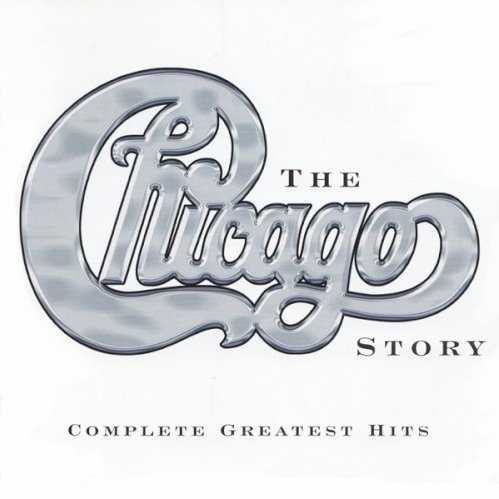 | Album: 36 of 42 Title: The Chicago Story: Complete Greatest Hits Released: 2002-10-28 Tracks: 19 Duration: 1:15:43 Scroll: Up Down Top Bottom 25% 50% 75% AlbumCover | 1 If You Leave Me Now (03:55) 2 Hard to Say I’m Sorry (03:49) 3 You’re the Inspiration (03:50) 4 I Don’t Wanna Live Without Your Love (03:56) 5 Baby, What a Big Surprise (03:05) 6 Hard Habit to Break (04:44) 7 Will You Still Love Me? (04:12) 8 What Kind of Man Would I Be? (single version) (04:14) 9 Look Away (04:00) 10 Love Me Tomorrow (03:58) 11 Along Comes a Woman (03:48) 12 Stay the Night (03:49) 13 You Come to My Senses (03:48) 14 I’m a Man (05:42) 15 You’re Not Alone (03:59) 16 Take Me Back to Chicago (02:58) 17 25 or 6 to 4 (04:52) 18 Saturday in the Park (03:55) 19 Colour My World (03:01) |
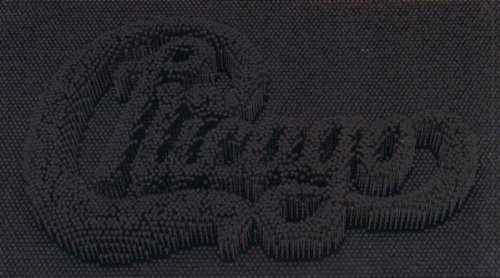 | Album: 37 of 42 Title: The Box Set Released: 2003-07-22 Tracks: 94 Duration: 6:33:44 Scroll: Up Down Top Bottom 25% 50% 75% Wikipedia AlbumCover | 1 Introduction (06:35) 2 Does Anybody Really Know What Time It Is? (03:22) 3 Beginnings (06:27) 4 Questions 67 and 68 (05:01) 5 Listen (03:24) 6 South California Purples (06:11) 7 Im a Man (05:43) 8 Movin In (04:06) 9 Wake Up Sunshine (02:33) 10 Ballet for a Girl in Buchannon (07:02) 11 Colour My World (03:01) 12 To Be Free/Now More Than Ever (02:43) 13 Fancy Colours (05:12) 14 25 or 6 to 4 (04:52) 15 Poem for the People (05:31) 16 It Better End Soon Movements 1, 3, 4 (06:36) 1 Loneliness Is Just a Word (02:37) 2 Flight 602 (02:44) 3 Free (02:18) 4 Mother (04:30) 5 Lowdown (03:37) 6 An Hour in the Shower (05:30) 7 A Hit by Varèse (04:53) 8 All Is Well (03:51) 9 Saturday in the Park (03:55) 10 Dialogue, Part I & II (07:12) 11 Just You ’n’ Me (03:44) 12 Something in This City Changes People (03:42) 13 In Terms of Two (03:30) 14 Feelin’ Stronger Every Day (04:14) 15 (I’ve Been) Searchin’ So Long (04:29) 16 Mongonucleosis (03:29) 17 Wishing You Were Here (04:36) 18 Call on Me (04:03) 19 Happy Man (03:16) 1 Harry Truman (03:02) 2 Old Days (03:30) 3 Brand New Love Affair, Part I & II (04:27) 4 Never Been in Love Before (04:10) 5 You Are on My Mind (03:12) 6 Mama Mama (03:30) 7 Hope for Love (03:04) 8 Another Rainy Day in New York City (03:03) 9 Gently I’ll Wake You (03:36) 10 If You Leave Me Now (03:55) 11 Mississippi Delta City Blues (04:41) 12 Baby, What a Big Surprise (03:05) 13 Take Me Back to Chicago (05:16) 14 Prelude (Little One) / Little One (06:35) 15 Gone Long Gone (03:59) 16 No Tell Lover (03:49) 17 Alive Again (03:29) 18 The Greatest Love on Earth (03:18) 19 Little Miss Lovin (04:36) 20 Hot Streets (05:14) 1 Street Player (04:23) 2 Must Have Been Crazy (03:24) 3 Manipulation (03:29) 4 Thunder and Lightning (03:32) 5 Song for You (03:41) 6 The American Dream (03:18) 7 Love Me Tomorrow (04:59) 8 Chains (03:22) 9 What Youre Missing (single version) (03:31) 10 Hard to Say I’m Sorry / Get Away (05:07) 11 Stay the Night (03:49) 12 We Can Stop the Hurtin (04:11) 13 Hard Habit to Break (04:44) 14 Along Comes a Woman (single version) (03:46) 15 You’re the Inspiration (03:50) 16 Good for Nothing (03:38) 17 If She Would Have Been Faithful… (03:51) 18 Forever (05:20) 19 Will You Still Love Me? (single version) (04:11) 20 Niagara Falls (03:41) 1 Heart in Pieces (05:05) 2 Look Away (04:00) 3 What Kind of Man Would I Be (04:19) 4 I Don’t Wanna Live Without Your Love (03:56) 5 We Can Last Forever (03:45) 6 Youre Not Alone (single version) (03:59) 7 Hearts in Trouble (single version) (04:01) 8 Only Time Can Heal the Wounded (04:39) 9 You Come to My Senses (03:48) 10 God Save the Queen (04:19) 11 Chasin’ the Wind (04:18) 12 All the Years (04:16) 13 Stone of Sisyphus (04:12) 14 Bigger Than Elvis (04:31) 15 Caravan (03:23) 16 Here in My Heart (04:14) 17 The Only One (single version) (04:38) 18 All Roads Lead to You (04:17) 19 Show Me a Sign (03:34) |
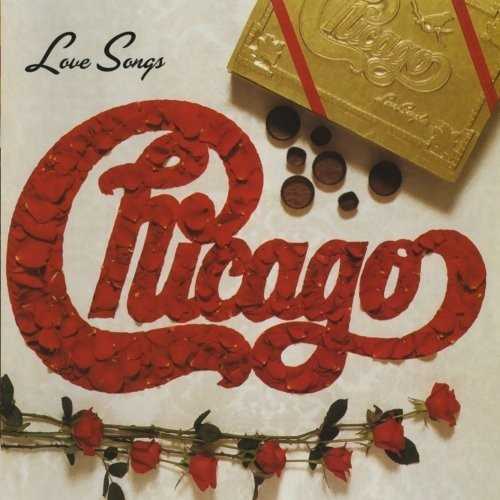 | Album: 38 of 42 Title: Love Songs Released: 2005-01-25 Tracks: 18 Duration: 1:17:02 Scroll: Up Down Top Bottom 25% 50% 75% Spotify Allmusic Wikipedia AlbumCover | 1 You’re the Inspiration (03:50) 2 If You Leave Me Now (live, 2004) (04:14) 3 Hard to Say I’m Sorry / Get Away (05:07) 4 Here in My Heart (04:14) 5 Call on Me (04:03) 6 Colour My World (03:01) 7 Just You ’n’ Me (03:44) 8 After the Love Has Gone (live, 2004) (05:19) 9 Hard Habit to Break (04:44) 10 Look Away (04:00) 11 Beginnings (06:27) 12 Happy Man (03:16) 13 Will You Still Love Me? (04:12) 14 No Tell Lover (03:49) 15 I Don’t Wanna Live Without Your Love (03:56) 16 Never Been in Love Before (04:10) 17 What Kind of Man Would I Be? (single version) (04:14) 18 Wishing You Were Here (04:36) |
| Love Songs : Allmusic album Review : Its fair to say that most of Chicagos hit singles were love songs, which makes compiling an album like Rhinos 2005 collection Love Songs a bit of an easy task. Theres not much risk that the collection will contain a bunch of little-known album tracks, since there are so many romantic hits in their catalog, and Love Songs proves that theory right, since most of the 18 songs here are among Chicagos best-known songs. This set leans heavily on the groups 80s recordings, both with and without Peter Cetera, but thats not a problem, since it gives the set a coherence. While this isnt a perfect collection -- it would have been nice if the original version of "If You Leave Me Now" was here instead of a live version from 2004 featuring Philip Bailey, and its also strange that Baileys group, Earth, Wind & Fire, is featured here with "After the Love Has Gone" in a live 2004 recording simply because Chicagos Bill Champlin is on the track -- it nevertheless contains nearly all of the bands biggest love songs, including "Youre the Inspiration," "Hard to Say Im Sorry," "Colour My World," "Look Away," "Will You Still Love Me?," "No Tell Lover," "What Kind of Man Would I Be?," and "Wishing You Were Here." That makes this disc an excellent choice for anybody seeking a Chicago album containing nothing but romantic music. Plus, the back cover art of candy hearts bearing Chicago song titles is kinda cute, too. | ||
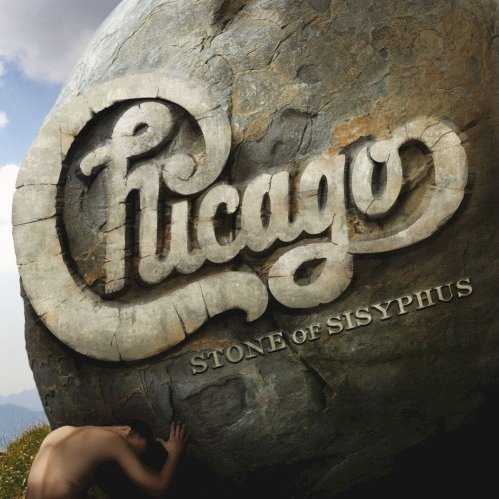 | Album: 39 of 42 Title: Chicago XXXII: Stone of Sisyphus Released: 2008-06-17 Tracks: 15 Duration: 1:09:42 Scroll: Up Down Top Bottom 25% 50% 75% Spotify Wikipedia AlbumCover | 1 Stone of Sisyphus (04:11) 2 Bigger Than Elvis (04:31) 3 All the Years (04:16) 4 Mah-Jong (04:42) 5 Sleeping in the Middle of the Bed (04:45) 6 Lets Take a Lifetime (04:56) 7 The Pull (04:17) 8 Here With Me (Candle for the Dark) (04:11) 9 Plaid (04:59) 10 Cry for the Lost (05:18) 11 The Show Must Go On (05:25) 12 Love Is Forever (demo) (04:14) 13 Mah-Jong (demo) (04:59) 14 Lets Take a Lifetime (demo) (04:15) 15 Stone of Sisyphus (No Rhythm Loop) (04:35) |
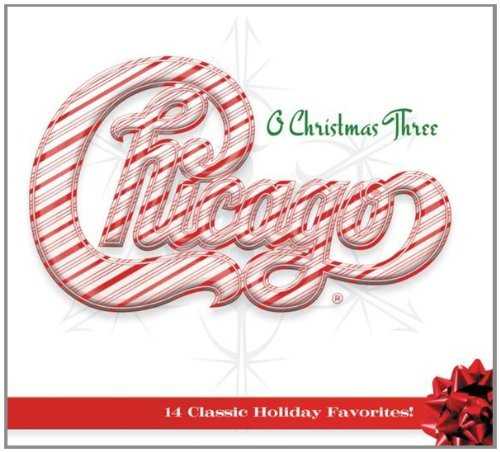 | Album: 40 of 42 Title: O Christmas Three Released: 2011-10-04 Tracks: 14 Duration: 51:12 Scroll: Up Down Top Bottom 25% 50% 75% Allmusic Wikipedia AlbumCover | 1 Wonderful Christmas Time (03:50) 2 Rockin Around the Christmas Tree (03:28) 3 I Saw Three Ships (03:05) 4 Merry Christmas, Happy Holidays (04:12) 5 What Are You Doing New Years Eve? (05:06) 6 Its the Most Wonderful Time of the Year (03:32) 7 Ill Be Home for Christmas (03:26) 8 On the Last Night of the Year (03:38) 9 Merry Christmas Darling (03:12) 10 Rockin and Rollin on Christmas Day (04:09) 11 My Favorite Things (03:20) 12 O Christmas Tree (03:44) 13 Jingle Bells (03:30) 14 Here Comes Santa Claus / Joy to the World (02:53) |
| O Christmas Three : Allmusic album Review : Now that Chicago have recorded their third collection of Christmas music -- cleverly titled O Christmas Three -- its a reasonable question to ask whether there are still new carols for the group to sing. Naturally, the answer is yes, there are songs that they missed on their first two seasonal LPs, and they do a fair bit of them here, including songs like "Rockin Around the Christmas Tree," "Ill Be Home for Christmas," "Jingle Bells," and, of course, "O Christmas Tree," all songs they missed the first time around. Also, they have upped the quotient of originals and recent holiday tunes, opening the record with a rendition of Paul McCartneys "Wonderful Christmas Time" featuring Dolly Parton. Shes not the only guest here, either, with America lending harmonies to "I Saw Three Ships," BeBe Winans singing "Merry Christmas Darling," and Steve Cropper laying down some guitar on "Rockin and Rollin on Christmas Day." Generally, Oh Christmas Three is brighter and cheerier than Chicagos two previous Christmas albums -- and those records were hardly dour, of course -- and that bit of good spirit is enough to make this the rare three-quel that doesnt dampen the legacy of whatever came before. | ||
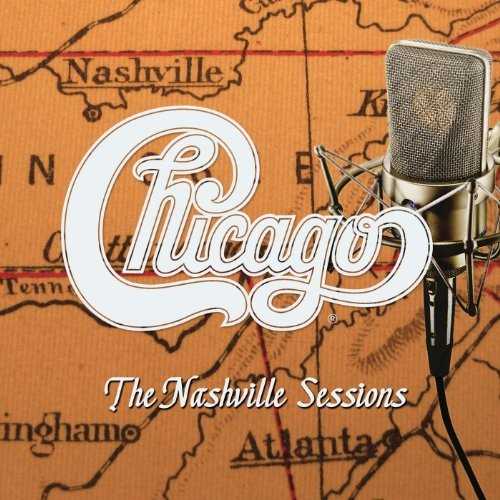 | Album: 41 of 42 Title: Chicago XXXV: The Nashville Sessions Released: 2013-04-26 Tracks: 15 Duration: 55:37 Scroll: Up Down Top Bottom 25% 50% 75% Wikipedia AlbumCover | 1 25 or 6 to 4 (04:51) 2 Make Me Smile (02:57) 3 Feelin Stronger Every Day (04:06) 4 Beginnings (02:44) 5 Saturday in the Park (03:53) 6 Colour My World (02:59) 7 Does Anybody Really Know What Time It Is? (03:21) 8 Questions 67 and 68 (04:46) 9 Old Days (03:21) 10 Just You n Me (03:42) 11 Call on Me (03:56) 12 Another Rainy Day in New York City (02:55) 13 No Tell Lover (03:44) 14 (Ive Been) Searchin So Long (04:31) 15 Alive Again (03:51) |
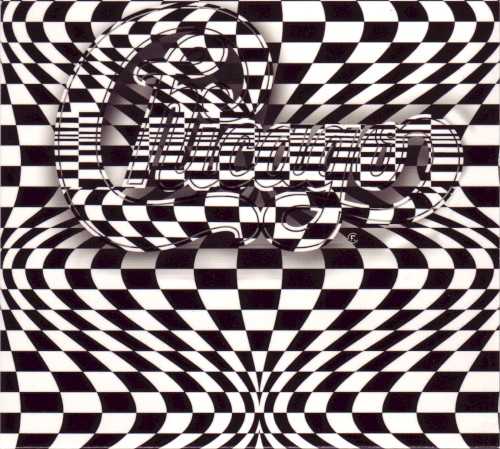 | Album: 42 of 42 Title: Chicago XXXVI: Now Released: 2014-06-18 Tracks: 11 Duration: 50:05 Scroll: Up Down Top Bottom 25% 50% 75% Spotify Wikipedia AlbumCover | 1 Now (04:57) 2 More Will Be Revealed (05:11) 3 America (04:04) 4 Crazy Happy (05:02) 5 Free at Last (05:12) 6 Love Lives On (05:18) 7 Something’s Coming, I Know (03:44) 8 Watching All the Colors (04:12) 9 Nice Girl (03:59) 10 Naked in the Garden of Allah (04:23) 11 Another Trippy Day (03:59) |